Importance of The Page 30
Marital Relationship Rabbi Shalom Rosner Scan to watch our Tisha B'Av Video






Simchat Shmuel Rabbi Sam Shor Page 50
In memory of my parents Yitzchak & Chana Heller z"l Dedicated by their daughter Dvorah Gorman
YERUSHALAYIM SHABBAT TIMES PARSHAT VA'ETCHANAN CANDLES 7:03PM • EARLIEST 6:13PM • HAVDALA 8:19PM • RABBEINU TAM 8:56PM ה"ב ISSUE 1526 ADVERTISING & SPONSORSHIPS 02-560-9125 TorahTidbits.com OU ISRAEL 02-560-9100 AVOT CHAPTER 4 ▪ SHABBAT NACHAMU 29 JULY 2023 ▪ ג"פשת בא א"י ןנחתאו תשרפ PARSHAT VA'ETCHANAN 'א:'מ והיעשי ימע ומחנ ומחנ
Table of Contents
04 Dear Torah Tidbits Family
06
08
18
22
28
Rabbi Avi Berman
Becoming A Great Nation
Rabbi Moshe Hauer
Aliya By Aliya Sedra Summary
Rabbi Reuven Tradburks
A Sabbath of Consolation
Rabbi Dr. Tzvi Hersh Weinreb
The Power of Why
Rabbi Lord Jonathan Sacks zt"l
Probing the Prophets
Rabbi Nachman Winkler
30 Importance of The Marital Relationship
Rabbi Shalom Rosner
32
OU Israel Schedule
38 Overcoming Obstacles
Rebbetzin Shira Smiles
THIS WEEK'S COVER IMAGE!
I pleaded with HashemLet me, I pray, cross over and see the good land -
40 Nachamu: Lift Our Burdens
Rabbi Judah Mischel
44 A World of Hashem "Echad"
Rabbi Moshe Taragin
48 From Stars to Soldiers: Acknowledging Hashem's Command
Rebbetzin Dr. Adina Smidman
50 Simchat Shmuel
52
Rabbi Sam Shor
Cowebell for Help
Rabbi Daniel Mann
56 Halachic Supervision
Rabbi Gideon Weitzman
60 The Y- Files Weekly Comic
Netanel Epstein
62 Torah 4 Teens by Teens
Gavriel Novick // Shua Golubtchik
Moshe Rabbeinu prayed 515 times to enter Israel (Gematria of 515 = ןנחתאו), but he wasn’t allowed to – he could just get a view of the land from the top of a cliff. The Vilna Gaon wanted to come to Israel, as did the Chafetz Chaim – but they were unable. We’re so lucky, we took a plane trip and here we are. This photo is a view from the cliff of Mount Arbel (the home of Nitai the Arbeli – and not far from our home) looking over the Galil and the Kinneret.
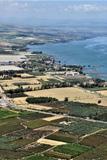
Photographed by Julian Alper, Manchester → Tverya 2014
HELPFUL REMINDERS
Tu B'Av is on Wednesday August 2nd
Last Opportunity to Say Kiddush Levana until: 15 Av, Tues. Aug. 1, until 11:22 pm
2 TORAH TIDBITS 1526 / VA'ETCHANAN
הבוטה ץראה־תא האראו אנ הרבעא
'ה לא ןנחתאו
CANDLE LIGHTING OTHER
Z'MANIM
JERUSALEM
All Times According to MyZmanim (20 mins before Sunset in most Cities; 40 mins in Yerushalyim and Petach Tikva; 30 mins in Tzfat and Haifa)
Daf Yomi this Shabbat: Gittin 74
OU Kashrut NCSY Jewish Action JLIC NJCD / Yachad / Our Way OU West Coast OU Press Synagogue/Community Services OU Advocacy OU Israel
MITCHEL R. AEDER, PRESIDENT OF THE ORTHODOX UNION Yehuda Neuberger, Chairman of the Board, Orthodox Union | Dr. Josh Penn, OU Kashrus Commission
RABBI MOSHE HAUER, EXECUTIVE VICE PRESIDENT | RABBI JOSHUA M. JOSEPH, ED.D.
EXECUTIVE VICE PRESIDENT & CHIEF OPERATING OFFICER Rabbi Dr. Tzvi Hersh Weinreb, Exec. V.P. Emeritus
OU KOSHER: Rabbi Menachem Genack, CEO/Rabbinic Administrator OU Kosher | Rabbi Moshe Elefant, COO/Executive Rabbinic Coordinator ISRAEL: Rabbi Yissachar Dov Krakowski, Rabbinic Administrator | Rabbi Ezra Friedman, The Gustave and Carol Jacobs Center for Kashrut Education/ Deputy Rabbinic Administrator
Headquarters: 40 Rector St. 4th floor, New York, NY 10006 212-563-4000 website: www.ou.org
Editor Emeritus: Phil Chernofsky
Editor: Rabbi Aaron Goldscheider | aarong@ouisrael.org
Advertising: Ita Rochel | 02-5609125 or ttads@ouisrael.org
Website: www.torahtidbits.com
Not getting enough TTs? Too many? None at all?
Contact our DISTRIBUTION 050-577-2111 • ttdist@ouisrael.org
Seymour J. Abrams • Orthodox Union Jerusalem World Center • Avrom Silver Jerusalem College for Adults • Wolinetz Family Shul • Makom BaLev • Birthright • Yachad • NCSY in Israel • JLIC in Israel • Camp Dror • Pearl & Harold M. Jacobs ZULA Outreach Center • The Jack Gindi Oraita Program • OU Israel Kashrut
STUART HERSHKOWITZ, PRESIDENT OU ISRAEL Zvi Sand / Yitzchak Fund: Former Presidents, OU Israel | Rabbi Emanuel Quint z”l, Senior Vice President | Prof. Meni Koslowsky, Vice President
VAAD MEMBERS:

Michael Elman | Yonatan Frankel | Yitchak Fund | Daniella Hellerstein | Stuart Hershkowitz | Jeremy Lustman | Meir Raskas | Atara Reichel | Zvi Sand | Norman Schmutter | Mark Schneider | Esther Williams
RABBI AVI BERMAN, EXECUTIVE DIRECTOR, OU ISRAEL
David Katz, CFO, OU Israel | Chaim Pelzner, Director of Programs, OU Israel | Rabbi Sam Shor, Director of Programs, OU Israel Center | Rabbi Sholom Gold zt"l, Dean, Avrom Silver Jerusalem College for Adults
22 Keren HaYesod <> POB 1441 <> Jerusalem 9101032
phone: (02) 560 9100 | fax: (02) 561-7432
email: office@ouisrael.org
website: www.ouisrael.org
Founders and initial benefactors of the OU Israel Center: George and Ilse Falk a"h
Torah Tidbits and many of the projects of OU Israel are assisted by grants from THE JERUSALEM MUNICIPALITY
OU Israel, Torah Tidbits does not endorse the political or halachic positions of its editor, columnists or advertisers, nor guarantee the quality of advertised services or products. Nor do we endorse the kashrut of hotels, restaurants, caterers or food products that are advertised in TT (except, of course, those under OU-Israel hashgacha). Any "promises" made in ads are the sole responsibility of the advertisers and not that of OU Israel, the OU Israel Center , Torah Tidbits.
OU ISRAEL CENTER 3 EIKEV VA'ETCHANAN HAVDALA EARLY CANDLES HAVDALA EARLY CANDLES 8:13 6:08 6:58 8:19 6:13 7:03 Yerushalayim / Maale Adumim 8:14 6:11 7:15 8:21 6:15 7:20 Aza Area (Netivot, Sderot et al) 8:13 6:09 7:16 8:20 6:14 7:22 Beit Shemesh / RBS 8:13 6:09 7:13 8:19 6:13 7:19 Alon Shvut 8:15 6:10 7:15 8:21 6:15 7:21 Raanana / Tel Mond / Herzliya / K. Saba 8:14 6:09 7:14 8:20 6:14 7:19 Modiin / Chashmonaim 8:15 6:11 7:15 8:22 6:15 7:21 Netanya 8:13 6:09 7:14 8:19 6:14 7:19 Be’er Sheva 8:14 6:10 7:15 8:21 6:15 7:20 Rehovot 8:15 6:10 6:58 8:21 6:15 7:03 Petach Tikva 8:14 6:09 7:14 8:20 6:14 7:20 Ginot Shomron 8:16 6:11 7:06 8:22 6:15 7:12 Haifa / Zichron 8:13 6:09 7:13 8:19 6:13 7:19 Gush Shiloh 8:15 6:11 7:15 8:21 6:15 7:21 Tel Aviv / Givat Shmuel 8:13 6:09 7:18 8:19 6:13 7:23 Givat Zeev 8:12 6:09 7:13 8:19 6:13 7:18 Chevron / Kiryat Arba 8:15 6:11 7:15 8:21 6:15 7:21 Ashkelon 8:14 6:10 7:15 8:20 6:14 7:20 Yad Binyamin 8:14 6:09 7:09 8:21 6:13 7:15 Tzfat / Bikat HaYarden 8:13 6:08 7:13 8:20 6:13 7:19 Golan 8:16 6:11 7:15 8:22 6:15 7:21 Nahariya/Maalot 8:14 6:09 7:14 8:21 6:14 7:20 Afula Rabbeinu Tam (Jerusalem) - 8:56PM • Next Week - 8:50PM
HAVDALA
AND
TIMES
26
August 5
8
Av Earliest Tallit and Tefillin 4:54 - 5:01 Sunrise 5:51 - 5:57 Sof Zman Kriat Shema 9:18 - 9:21 Magen Avraham 8:36 - 8:40 Sof Zman Tefila 10:27 - 10:29 (According to the Gra and Baal HaTanya) Chatzot (Halachic Noon) 12:45 Mincha Gedola (Earliest Mincha) 1:20 - 1:19 Plag Mincha 6:14 - 6:08 Sunset (Including Elevation) 7:45 - 7:37
Ranges 11 days Wed - Shabbat July
-
/
- 18
DEAR TORAH TIDBITS FAMILY
RABBI AVI BERMAN Executive Director, OU Israel

I remember as a child, the focus of the fast days connected to the churban (destruction) and the Beit HaMikdash (Temple) - Asara B’Tevet, Shiva Asar B’Tammuz and Tisha B’Av – was not only on the churban Beit HaMikdash but also on the Holocaust. In fact, the Chief Rabbinate of the State of Israel established Asara B’Tevet to be Yom Kaddish Klali (general day to say kaddish ) for those murdered in the Holocaust. There are obvious reasons why the Holocaust is a focus of these days. First of all, we lost half of our nation in the most horrific ways possible. Second, we do not have footage of the destruction of the First or Second Temples, but we have footage from the Holocaust and brave survivors that have been sharing their stories. When trying to make churban relevant to the younger generation, and even adults, it is easier when you have testimonials and visuals. In the 21st century, we are all visual learners.
A number of years ago, my wife Pnina told me, “Avi, I think it’s important that we take our kids to see elements of the churban during the three weeks to help them feel the Three Weeks and Tisha B’Av in a more meanigful way.” That year, we took the kids to the Kotel tunnels, the Burnt House,
the roof of Aish HaTorah, and a few other places in order to connect ourselves and our children to the churban. My wife’s idea helped us all connect to this time period in a deep and meanigful way. That Tisha B’Av was without a doubt the most meaningful Tisha B’Av I have had.
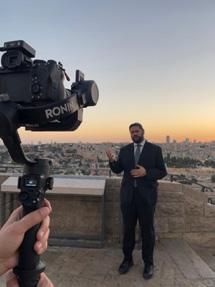
Walking through these places and seeing what the Jewish people built in order to serve and connect to Hashem in the times of the Temples is incredible. The Temple comes to life when you understand that there were 170 mikvaot (ritual baths) found around Har HaBayit (Temple Mount) over the past several decades, or you see the rooms that most probably served as the shuk (shopping center) where ancient Jews bought animals to sacrifice in the Beit HaMikdash, in addition to purchasing everyday items including spices and produce.
WE REMEMBER
18th of Menachem Av
(Shabbat, Aug. 5th - the actual day this year) is the anniversary of the 1929 Chevron Massacre in which 67 Jews were killed, including 24 Chevron Yeshiva students
םמד םוקי ’ה
4 TORAH TIDBITS 1526 / VA'ETCHANAN
Modern Yerushalayim is built up with highways, skyscrapers, beautiful homes, etc. It is a gathering place for Jews from all around the world. These factors can make it even harder to realize what we are missing. Therefore, visiting historic sites can make these days and Tisha B‘Av much more meanigful. The more we understand what was, the more the Beit HaMikdash comes to life, and the more we realize what we are missing today.
Although I can’t physically take all of you on a tour like I did with my children, I want to provide you with a similar experience in a video OU Israel made to help us all connect to this time period of Tisha B’Av and Shabbat Nachamu – Beit HaMikdash: What We Had & What’s to Come. In the video, you will join me as we visit and connect to the Kotel tunnels, the Temple Institute, and Har HaZetim. We will help you understand the destruction and the future geulah (redemption) we are praying for –what was, what is and what will be.
I am writing this before Tisha B’Av, and I am hoping that some of you already saw and were uplifted by this video. The rest of you can view it on our website (www. ouisrael.org/tishabav) and OU Israel YouTube channel (youtube.com/@theouisrael) or by scanning the QR code on the front page. The message is timely as we celebrate Shabbat Nachamu and embark on the sheva d’nechmeta (7 weeks of comfort from Tisha B’Av through Rosh HaShanah). Special thank you to OU Israel Director of Marketing Laya Bejell, our social media manager Nina Broder who worked diligently on the creation of this video, and Zev Schwartz who grew-up in the Rova
and whose passion for the Old City came through in his work. It is our hope that Bezrat Hashem this video, as well as the kinot, shiurim, and other videos, will give you a better understanding of what the Jewish people had when the Temples stood on Har HaBayit and what we are missing today.

Bezrat Hashem we will incorporate the lessons of the three weeks and Tisha B’Av into our lives to give us the drive to fix this world and prepare it for the third Beit HaMikdash. While I desperately hope and pray that the Beit HaMikdash will be rebuilt by the time you get this Torah Tidbits, in case it’s not, let’s do all that is in our power to ensure that next year we will be celebrating Tisha B’Av.
Wishing you all a safe and enjoyable bein ha’zmanim and an uplifting and inspiring Shabbat,
Rabbi Avi Berman Executive Director, OU Israel aberman@ouisrael.org
The OU Israel Family sends it heartfelt condolences to Shulamit Neaman and family on the passing of her husband
YEHOSHUA z”l
For many years, Yehoshua, together with Shulamit א”לבת enriched the lives of many Olim by guiding them and showing them the beauty of Eretz Yisrael through OU Israel tiyulim and programs. For that we are forever indebted to them.
OU ISRAEL CENTER 5
ל”ז האל היח ןב םייח עשוהי
םילשוריו ןויצ ילבא ראש ךותב םכתא םחני םוקמה
MOSHE HAUER OU EXECUTIVE VICE PRESIDENT

Becoming A Great Nation
The first promise given to Avraham (Bereishit 12:2) was that he would be made into a goy gadol, “ a great nation,” but it is only in this week’s Parsha (Devarim 4:7-8) that we can see what that greatness implies:
“For what great nation ( goy gadol ) is there that has a G-d so close at hand as is Hashem our G-d whenever we call upon Him? Or what great nation (goy gadol) has laws and rules as perfect as all this Torah that I set before you this day?”
Evidently, the greatness of Klal Yisrael –the quality of goy gadol - is defined not by our size or prominence but by our relationship with G-d as reflected by the power of our Tefillah and the wisdom of our Torah.
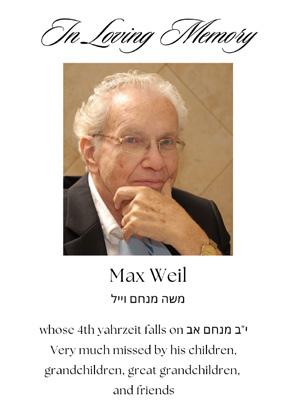
From the time of Avraham, our story is punctuated by the Tefillot offered by our Avot and Imahot at every juncture. The children they bore, the crises they averted, and the Exodus itself all came about by – and were attributed to - their prayers. And the story of our own time, the Nachamu Ami revival of our people post-Holocaust, must likewise be seen as the product of the millennia of our prayers. Three times a day and every time we concluded a meal, each and every time we ask of G-d that He not only allow us to
continue as a people, but that He restore our people to Yerushalayim and Yerushalayim to our people.
The story of our people similarly brings forth the greatness of Torah as a system of truth and of justice that demonstrates principle, wisdom, and understanding (Devarim 4:6): “Observe them faithfully, for that will evidence your wisdom and discernment to other peoples, who on hearing of all these laws will say, ‘Surely, that great nation is a wise and discerning people.’” Lived properly, the Torah presents a value system for life and a framework for a true and just society. While the demands of our
6 TORAH TIDBITS 1526 / VA'ETCHANAN
FROM THE DESK OF RABBI
ritual life may appear puzzling to some, the fuller picture demonstrates how Torah life and observance produce a community of people living with awareness of and gratitude towards their Creator, motivated by the values of caring and compassion and the pursuit of wisdom and truth in theory and in practice.

Tefillah and Torah are the core elements of our greatness as a people. They are at the center of our original promise and mission and the key to our thriving as a people. Sadly, we well understand that Jewish history and current events are replete with tragedy and failure, periods where we do not manifest this greatness. It is for this reason that as we transition from our focus on the grief of those tragic failures to the comfort and consolation of rebuilding, Nachamu Ami, that we double down and focus on living our mission as a people: strengthening and deepening our relationship to G-d through Tefillah and living lives that reflect the truest values of Torah, both as individuals and as a community. We will reach our purpose as a nation and will be blessed with Hashem’s redemption when we live up to this charge, living lives of deep relationship to G-d and commitment to the truest values of Torah.

Keren Malki empowers families of children with special needs in Israel to choose home care. Donations are tax-approved in Israel, US and UK.


kerenmalki.org
02-567-0602




Honoring the memory of Malka Chana Roth ד”יה 1985-2001, killed in the Sbarro bombing.



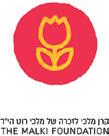
OU ISRAEL CENTER 7
Engagement Rings ∙ Stud Earrings Pendants ∙ Tennis Bracelets 050-573-9061 jeffmor36@gmail.com www.JeffMorDiamondJewelry.com
True wholesaler from the diamond boursa with over 25 years experience member diamond dealers
club
ALIYA-BY-ALIYA SEDRA SUMMARY
PARSHAT VA’ETCHANAN
1ST ALIYA (3:23 - 4:4)
I beseeched G-d to allow me to enter the Land. He refused: ascend the mountain, gaze at the Land that you will not enter. Charge Yehoshua, for he will lead the people. Now, Yisrael Shema, listen to the commandments so you will remain in the Land. You saw what occurred with Baal Peor: those who followed Baal Peor were punished while those who did not, survived.
In this aliya, Moshe’s speech pivots. In Parshat Devarim he spoke of the march to the Land: the hiccup of 40 years because of the spies, the resumed march and its victories over Sichon and Og. The march to the Land was the topic. This first part of this aliya should really be in last week’s parsha. I too want to enter the Land, but G-d refused, allowing me only a glimpse.
RABBI YONA REISS, Av Beit Din cRc and Rosh Yeshiva RIETS will give his annual yarhzeit shiur in memory of his father
HARRY REISS z”l
Sunday, August 6, at 8:30pm
Topic: JEWS and TATTOOS
at the Gruss Campus of Yeshiva University
40 Duvdevani Street, Bayit Vegan, Jerusalem
ZOOM option ID: 875 3599 6785
Then the next theme in Moshe’s speech begins: life in the Land. Perhaps G-d’s refusal to allow Moshe into the Land is the perfect preamble to the discussion of life in the Land. Know this: living in the Land is a gift, a Divine gift. He gives. And He takes. You have no claim on this gift. I know from experience. Live so that you deserve it.
2ND
ALIYA (4:5 - 40)
Keep the mitzvot, for they are wise. The nations will look at the mitzvot and say: what a wise people. And who has a G-d as close as ours is to us? Or who has noble laws as our Torah? Remember the day at Sinai, the mountain on fire and the darkness of the cloud. The Voice emanated but there was no form. Make no images. I taught you the mitzvot; keep them, for they are the covenant G-d commanded from you. Your children will make images and be exiled, flung to the ends of the earth, serving idols there. They will return to G-d, seeking Him with all their heart. He will not forget His covenant. Has any other people heard G-d’s voice amidst fire? Or another one Who took His people with wonders from amidst another? Know and take to heart that there is none other than G-d.
Moshe emphasizes 2 unique things we enjoy: our G-d and our Torah. Other nations recognize this. The implied message here is: why go running to other gods and other religions when yours is so profound that the

8 TORAH TIDBITS 1526 / VA'ETCHANAN
RABBI REUVEN TRADBURKS RCA ISRAEL REGION
other nations recognize it. If they see our religion as profound, we too ought to.
3RD ALIYA (4:41 - 49)

Moshe separated 3 cities of refuge for those who kill accidentally on the east side of the Jordan. Moshe taught these laws on the east side of the Jordan in the lands already conquered. These conquered lands extend from the Dead Sea all the way to Mt. Hermon.

Moshe’s choosing 3 cities of refuge on the east side of the Jordan, is his confirmation of the right of Bnei Gad, Bnei Reuven and half of Menashe to dwell there. Rav Yoel Bin Nun contends that this vast area over the Jordan becomes part of the promised Land. Moshe was told in the 1st aliya to ascend the mountain and look west, north, south and east. Well, looking east would be away from the Land of Israel. Why look there? Hence, he maintains that the defeat of Sichon and Og was the beginning of the conquering of the land and that those lands became part of Eretz Yisrael. Moshe looks east because that Land is also part of Eretz Yisrael. Moshe himself does participate in at least the beginning of the conquest of the Land of Israel.
4TH ALIYA (5:1 - 18)

Mt. Sinai. Moshe called the people: Shema Yisrael to the commandments, for our G-d made a covenant at Sinai. He made it with you, face to face amidst fire. I communicated it because you were afraid. And He said: I am G-d who took you out of Egypt. Do not make images. Or take My name in vain. Guard Shabbat as a day of rest to remember that you were slaves in Egypt. Honor your father and mother. Do not murder, commit adultery, steal, bear false witness, covet.


OU ISRAEL CENTER 9
L I V E O P P O S I T E T H E S E A d av id z @ A s h ke lo n P ro p e rt ie s .c o m c a l l D a v i d a t 0 5 4 - 4 3 3 - 2 6 2 1 w w w.a s h ke lo n p ro p e r ti e s .c o m C o n t a c t u s f o r t h e l a r g e s t s e l e c t i o n o f s e a - v i e w p r o p e r t i e s f o r s a l e o r r e n t .
I love that we are so close to the beach, especially on these hot days! And that’s why the grandchildren are coming!
Please remind me to thank David for the nice discount he arranged for us, dear.
Moshe describes the giving of the Torah at Sinai. In doing so, he emphasizes the brit, the covenant. It is this covenant that animates the entire rest of the book. There are 2 covenants: the brit made with Avraham to give his children the Land. And the brit made at Sinai, which is mitzvot that we are to keep. The first brit, to give us the Land, came with no particular expectations. Not so the second brit. And that is what Moshe is now emphasizing. Don’t stop at brit 1: it is bound to brit 2. The giving of the Land is bound up with the mitzvot. Not that it is contingent on it. It sounds from Breishit that the promise of the Land is without expectations. But the success in the Land is bound up with brit 2, the mitzvot. The promise of the Land never wanes; success in the Land can. Moshe introduces this theme here, at the outset of his long speech to the people; and it is this theme that will resonate through the entire rest of his speech.
5TH
ALIYA (5:19 - 6:3)
When you heard these words amidst the fire and the cloud you were afraid. You approached and said: now we know man can hear G-d’s voice but we are afraid we will die. Moshe, you hear from Him, not us. G-d agreed and said to me: you stand with Me and I will tell you all the commandments to keep in the Land. The word Shema appears 8 times in the
first 7 verses of this aliya. The people heard the Voice at Sinai but were afraid. So, Moshe, you hear it for us. And G-d heard their suggestion and said it was good. Fine, Moshe will hear G-d’s voice. But who hears, is not the issue. The issue is who hears. I mean, who hears the voice with his ear; that can be Moshe. That’s fine. But who hears, I mean, hears, gets it, understands it, accepts it; that, is you. Hence the last verse in the aliya, 8 verses later, comes back to Shema: Shemata Yisrael, you heard Israel and hence, keep the mitzvot. There is hearing and there is hearing. Moshe is your hearing aid to hear; but you are the ones who need to hear.
6TH ALIYA (6:4 – 25)
The Shema. Shema Yisrael, G-d is one. You shall love G-d, and have that in your heart constantly; teaching of it to your children, speaking of it, at all times and in all places. Be bound with love of G-d; let it guide you and your home. When you come into the Land, you will find things that you did not build: large and good cities, homes full of wonderful things, cisterns, vineyards, olive groves. But be careful to not forget G-d. Fear Him, serve Him. Do what is moral and good in His eyes and He will do good for you. When your children ask you about all these commandments, tell them: we were slaves in Egypt, G-d took us out to give us this Land. These commandments are to cultivate awe of Him and bring us merit, to preserve us in this Land.
Missed
While we love the first line of the Shema, it is the second that is the emphasis of the paragraph. Love of G-d. All your heart, all your soul, all your might. We are used to
10 TORAH TIDBITS 1526 / VA'ETCHANAN
May the learning from this issue of TT be נ”על Rose Edith Cohen ה”ע ה”ע ןהכה בייל היראו אשנג תב לזייר הטיא on her 15th yahrzeit, בא םחנמ ג”י
very
much by her daughters, Janice Weinreb, Barbara Yasgur and Benay Devora Cohen Nesher and families
more about patient self-control than physical might. It is found in the Talmudic tractate Kiddushin 40a, where the tale is told about a certain Rabbi Zadok, who resists the attempts of a particularly powerful noblewoman to lead him astray. He exerts moral strength, and to him the Talmud applies the following biblical verse: "Bless the Lord, O His angels, mighty creatures who do His bidding, ever obedient to His bidding. Bless the Lord, all His hosts, His servants who do His will." (Psalms 103:20-21)
saying this line so we become numb to its power. Moshe is speaking to the people: pour yourself into this. Let it go. Put all you’ve got in this. No inhibitions. Love of G-d is to animate all of your life: bubbling over to your children, percolating in you in your travels, your actions, your thoughts, your home. Wow. Little wonder that this paragraph is the heart of our daily tefila. We need to be G-d obsessed. Moshe is plain as day here: love G-d with all your heart, soul and might. All in.
JERUSALEM
SHAAREI CHESSED / RECHAVIA
*Duplex! 5 bdrms, 25 sqm kitchen, succah, shabbat elevator, 2 parking, storage.
*Renovated 110 sqm 3 bdrms, 1st floor, succah.
*New 228 sqm duplex penthouse, 30 sqm succah, shabbat elevator, parking, view.
TALBIEH-250 sqm+200 sqm garden, priv. land
OLD KATAMON
160 sqm 4 bdrms, garden, storage, parking, Occupancy - 1.5 years.
ARNONA
New renovated 2 bdrms, large balcony, elevator, storage, parking. Can be sold furnished
TALPIOT
4 rms, balcony, elevator, machsan, parking, view.
7TH ALIYA (7:1 - 11)
NACHLAOT
Isaac's way recognizes the necessity for great patience and forbearance. If we adopt Isaac's way, we must be prepared for a lengthy process before our challenges are resolved. In the words of Rabbi Abraham Isaac Kook, words which have been memorialized in a popular song, "An eternal people does not fear the long and arduous path."
May the Torah learned from this issue of TT be in loving memory and נ"על our dear parents whose yahrtzeits are in Kislev
Doris Weinberger a"h
When you come into the Land, conquer the seven nations. Do not make any covenant with them. Do not marry them, for that will lead to idol worship. You are G-d’s holy people. Not because you are numerous but because He loved you and made a covenant with you. Know: He keeps His covenant. You too keep the mitzvot.
Beautiful, spacious 4 room luxury unit, 2.5 baths, 2 oor, Shabbat elevator, large succa terrace, storage + covered parking.
2 rms, priv entr, storage room, NIS 2,210,000
HAR NOF -New listings!

*Central! 4 bdrms incl. 2 en suite, entrance level, option for separate unit/office.
*Centrally Located– 10 room duplex with 400 sqm garden (room for a pool), excellent condition
RENTAL - RECHAVIA
Spacious, 2 bdrms, priv. entr. no steps, furnished.
z”l
Greatly missed by their children, grandchildren and great grandchildren
Rav Aryeh and Dvora Weinberger
Bernie and Leah Weinberger
Patience is necessary for those who follow Isaac's way. But a wise woman taught us that patience is but another name for hope. That woman was Jane Austen, who put these words into the mouth of one of the characters in her great novel, Sense and Sensibility: "Know your own happiness. You want nothing but patience—or give it a more fascinating name: call it hope."
Menachem and Hannah Katten
In observance of the Shloshim of our friend
Yehuda Leib Berren z"l
Rav Menachem Weinberg will give a shiur in his memory "Heroic Joy"
Monday evening, 23 November/ 8 Kislev
7:30pm
Zoom Meeting: 853 8980 1519
Password: Yehuda
The love of G-d is exclusive. Idol worship violates that love. Be wary that the path to this infidelity is people. Covenants with the idol worshippers of the land will soften the way to their gods. And certainly, marrying the people of the land accelerates the path to their gods. That is the allure of belonging. Marry a woman, join her faith group, enjoy the fellowship, camaraderie; the sense of belonging that a faith community brings. There are a lot of wonderful and satisfying elements to any faith community. But. That is a complete violation of your unique relationship with G-d (in addition to the folly of these gods). It is not the mind that attracts you; it is the community that comes with the wife. Marrying the non-Jew begins the
shmuelnathan4@gmail.com
OU ISRAEL CENTER 11
OU ISRAEL CENTER 15
SEALING SERVICES
Exclusive! SHELLY LANDAU PROPERTIES LTD & EVA AVIAD REALTY bayitsheli@gmail.com www.aviadrealty.com 052-385-9944 • 054-499-9043 Rehavia-Talbieh on quiet Radak
ולסכ 'ד -ה"ע המלש לאקזחי תב האל הרובד
Weinberger
ולסכ ז"כ -ל"ז בד ןב ךלמילא
Max
SEALING SERVICES AND ROOFING
FOR MANY MORE PROPERTIES: 02-651-4030
SALES
Eiferman Properties www.eifermanrealty.comLtd.
one fundamental speaks nor with people means me. is when what those purpose next very the heard. the to accept his is the G-d, his humility. people oppoastell My
process of idol worship. Hence, avoid intermarriage.
YESHAYAHU 40:1-26
been forgiven.”
Owning your own apartment does not just allow you freedom, but offers monetary savings, and an increase in your investment value.
Anglo-populated, sunny Ashkelon is the answer!
This week’s haftorah is the first of a series of seven “haftarot of Consolation.” These seven haftarot start on the Shabbat following Tisha B’Av and continue until Rosh Hashanah.
It’s very affordable – from $500,000 with just a 15% down payment, mortgages available as well as bank guarantees. Rental income often in excess of 3.5%.
This section of Yeshayahu begins with G - d’s conveying to the prophet: “Console, O console My people . . . Announce to Jerusalem that her period of exile has been fulfilled and that her sins have
Yeshayahu’s prophecy describes some of the remarkable events that will unfold with the onset of the messianic era. These include: the return of the exiles to Yerushalayim, the revelation of Hashem’s glory, and the rewards and retribution that will then be meted out to the nations of the world.

The navi then goes on to comfort the people, describing G-d’s power and might, and reassuring them of His care for His people.
STATS
45th of 54 sedras; 2nd of 11 in Devarim.
Written on 249 lines in a Torah, rank: 7. 21 parshiyot: 5 open, 16 closed, 7th (tied with Ki Tavo).
122 p'sukim - rank 17th (2nd in Devarim), same as Vayak'hel & Ki Tavo - but larger.
1878 words - rank 10th (2nd in Devarim).
7343 letters - rank 10th (2nd in Devarim). Va'etchanan's p'sukim are longer than average, hence the jump in rank from 17th for p'sukim to 10th for words.
MITZVOT
12 of 613 mitzvot: 8 positive, 4 prohibitions and many more that are counted elsewhere - this is so for several sedras, but it really shows for Va'etchanan (e.g. Aseret HaDibrot in Yitro has 14 mitzvot, repeated here but not counted here)

12 TORAH TIDBITS 1526 / VA'ETCHANAN
7
MarSea Modest Swim & Casualwear www.MarSeaModest.net (NIS) www.MarSeaModest.com ($USD) Marci Rapp 050-424-8359 d av i d z @A s h ke l o n P r o p e r t i e s . c o m L I V E O P P O S I T E T H E S E A 0 5 4 4 - 3 3 2 6 2 1
“It sounded too good said another happy client
to be true – a superb sea-view apartment in Anglo-populated Ashkelon for only 15% down – is actually a reality.”
We're growing We're growing
Non-profit organization in Jerusalem is looking to hire an energetic team member for meaningful and challenging work in the
Community Relations Department
Start immediately. CV and letters of recommendation: admin@lifeline.org.il
The position:
•English communication and content writing.

•Maintaining CRM.
•Guiding groups and visitors through our workshops.
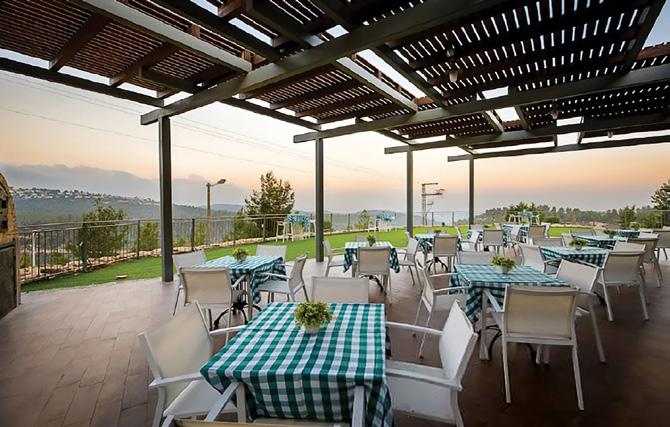
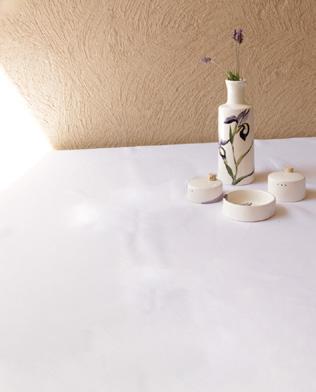
Requirements:
1. Academic education.
2. Native English speaker must (advantage of fluent Hebrew).
3. Relevant experience.
4. Knowledge of computer applications.
5. Organized, responsible, committed and loyal, good interpersonal skills and ability to work in a team.
Scholar in Residence
Rabbi Professor
Daniel Sinclair
Mehadrin Rabbanut
OU ISRAEL CENTER 13
zvilapian@gmail.com Tel. 054-447-3851 Toll free UK: 0800-098-8428 US: 1-800-376-1803 Join Zvi Lapian for an exceptional and relaxing SUKKOT at the NEVE ILAN Hotel in the Judean Hills Sep 29 - Oct 7 2023
zvilapian@gmail.com Tel. 054-447-3851 Toll free UK: 0800-098-8428 US: 1-800-376-1803
Hosted by Zvi Lapian & Michael Smigel
Be’er Tziporah a"h - Bottled Water Gemach




Walking down King George St. in Jerusalem and want a cold bottle of water?

Come help yourself to a bottle at 52 King George.
In loving memory of Yoni’s wife Tziporah a"h, a true Eishes Chayil, always full of chessed, kindness and laughter, and brought life and strength to so many people, that she touched! She was like Aron, who loved peace and pursued peace.

Yoni thanks Hashem for having the opportunity of having Tziporah in his life, to learn of her caring, patience and happiness, to overcome her challenges. May Tziporah's Neshama be a light onto the world, in a time of darkness, and may her Neshama shine to Gan Eden. Yoni misses Tziporah with tears in his eyes, as Hashem gave him a gift, a crown jewel, now he returns her to Hashem. With thanks and Toda. Love, Yoni
To help refill the supplysend tax deductible donations for Be’er Tziporah a"h Bottled Water Gemach to Chabad of RechaviaRabbi Yisroel Goldberg email

14 TORAH TIDBITS 1526 / VA'ETCHANAN ARE YOU CONCERNED ABOUT... Alzheimer's? Dementia? Memory loss? Cognitive decline? Forgetting places/names? Losing things? Functional Medicine Clinic VISIT OUR WEBSITE AT BEYOUNG.LIFE 02.622.8674 info@beyoungclinics.com Dr. Barry Dinner MBBCH, ABAARM is a highly experienced physician, certified by the American Academy of Anti-Aging Medicine, who offers a unique approach to anyone looking to prevent and treat Alzheimer’s disease, memory loss or cognitive decline. OTHER SPECIALTIES Cardiovascular • Stress Hormone • Gastrointestinal Ask us about our new super brain supplement ReMIND
Rabbi@JerusalemChabad.org 02 800-1717 www.JerusalermChabad.org/DonateShekels בוט יכ 'הל ודוה
LIFE SETTLEMENTS
Do you have a life insurance policy you:
• No longer want?
• No longer need?

• Can no longer afford the premium?
• Could you use extra money instead of keeping your policy?
I can guarantee that if you qualify with the underwriting process I can get you more money than if you cash it in with the company.
and our next step will be to plant a fruit tree. I never thought of myself as being the agricultural type, but the feeling of settling and planting a portion of Eretz Yisrael, has been truly euphoric. Iy”H, when we plant our tree, and eat the fruits that will grow one day, I think we will be able to truly appreciate that unique Kedusha found in the fruit of Eretz Yisrael!
Please contact Moshe Russell at: Buymypolicy32@gmail.com



MICHAL NOAM
+972-54-6108477
michalnre@gmail.com
FOR SALE IN REHAVIA
City Center near Yeshurun Synagogue
•4 rooms apartment(now 3) •109 sqm
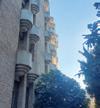

•Storage room •Shabbat Elevator
•Private Parking Spot •2 balconies
To conclude, when you buy your Tu B'shvat fruit this year, don’t search for those dried apricots and banana chips imported from Turkey. Rather, head over to the fresh produce and buy yourself some nice juicy Kedusha-filled Jaffa oranges and thank Hashem for bringing you to this land in order to be able to הבוטמ עבשלו הירפמ לוכאל, imbibing that Kedusha in every bite that you take!!
is blessed by G-d: he lives in Beer L’chai Roi. The transition from Avraham to Yitzchak is complete. While G-d has been a silent partner in this parsha, here He completes the generational transfer – He blesses Yitzchak. The Jewish people willtions of Yishmael are enumerated. Yishmael dies. His -
echoes tions woman and began father’s that his icant the
BY RABBI av, Beit Knesset
When Avraham addresses the people of Cheit, trying to “Ger V’Toshav Anochi Eimachem” (23:4) “A Stranger and This seems to be a contradiction. If one is a stranger than
The Magid of Dubno (Jacob ben Wolf Kranz 1741-1804) this tense situation in order to, both, state his truth and be said, on the one hand, “I am a Resident’ due to G-d’s promise need your agreement to purchase a plot. In other words, Avraham “strangers”, while they understood him as saying that “they”
The peace was kept, and Avraham remained true to his
OU ISRAEL CENTER 15
ous and powerful offspring. The brevity OU ISRAEL CENTER 75
DO YOU LOVE JERUSALEM?


DISCOVER:

JERUSALEM

A Neighborhood Street Guide Chanoch Shudofsky
Streets: By-ways to boulevards

Themed Neighborhoods: Biblical, Medieval, & Modern
Find them all in
JERUSALEM: A NEIGHBORHOOD STREET GUIDE


AVAILABLE AT -
המלש האופר
Yosef Ezriel ben Chaya Michal
Chana bat Bruriah
Feyge Sara bas Chaya Peshe
Nechama Charna bat Feigel
Menachem Benzion ben Shulamit
Leah Naomi bat Tova

אנדהאב לרפ ןב עשוהי םהרבא
הגלוא ןב קיזייא בל
הלחמ ןב ןתנוהי
Gemach for Chatan and Kalla: Meals for wedding and Sheva Brachot at cost

Eida Hachareidis Hechsher
Tel:052-633-1744

gadgadood@gmail.com


16 TORAH TIDBITS 1526 / VA'ETCHANAN
Yemin Moshe
Nahlaot King George Derech Hevron
Ben Yehuda Yafo Arnona
Pomeranz Book Store, The OU Israel Center, or directly from the author at chanochshudofsky@gmail.com
125th YEAR ANNIVERSARY SECURITY, SAFETY & RESCUE SERVICES
We want to acknowledge your demanding and heroic work, and assure you that your furniture repair needs will be taken care of by professionals who value your dedication. As a token of our appreciation for your diligence and service, we're offering a special discount of 15% on all furniture repairs*

*Valid from August 1-31, 2023 - upon presentation of a valid ID
ARCH. RENOVATED APT, RECHAVIA/KK"L, JLM

2BR|70m²|2nd floor|3 balconies|high ceilings
NIS 3,950,000 - Tehila: 050-420-5333
AUTHENTIC PRIVATE HOUSE NACHLAOT, JLM
Duplex+Studio|on 3 levels |105m²|8m² balconies
NIS 4,950,000 - Tehila: 050-420-5333
BRAND NEW APT, MISHKENOT HAUMA, JLM
3BR|108m²|4th floor|8m² balcony|parking|accessible
NIS 4,650,000 - Tehila: 050-420-5333
AMAZING 3 STORY COTTAGE, BET HAKEREM, JLM
4.5BR|179m² built|180m² garden|renovated
NIS 7,950,000 - Tehila: 050-420-5333
HISTORICAL AUTHENTIC PRIV. HOME, NACHLAOT, JLM


Built 220.4m² |balconies+patio 47+34m² |lots of potential
PRICE REDUCTION! NIS 10,850,000 - Tehila: 050-420-5333
BRAND NEW SPACIOUS LUX. APT, TALBIYA, JLM
2.5BR|5th floor|116m²|sukkah balcony|parking
NIS 7,600,000 - Tehila: 050-420-5333

SPECTACULAR PENTHOUSE, OLD KATAMON, JLM 4.5BR penthouse |140m²| roof terrace with view
PRICE REDUCTION! NIS 7,350,000 - Noa: 052-870-2387
AMAZING DUPLEX PENTHOUSE, EFRAT
4BR |168m² | large balconies |3 exposures
NIS 3,750,000 - Noa: 052-870-2387
COTTAGE WITH TREMENDOUS POTENTIAL, EFRAT
6BR|190m²|on 4 levels|3 baths|sukkah balcony
NIS 3,690,000 - Noa: 052-870-2387
BEAUTIFUL SEMI-DETACHED HOME, EFRAT
5BR |3 stories |180m² built |160m² garden
NIS 4,500,000 - Noa: 052-870-2387
FABULOUS APT WITH CHARMING YARD, MITZPE YERICHO
6BR | 165m² built | 70m² garden|storage unit
NIS 3,285,000 - Mordechai: 052-720-3089
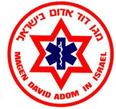
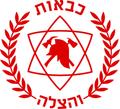
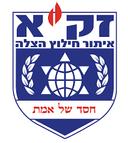
STUNNING PRIVATE VILLA WITH VIEW, MITZPE YERICHO
5BR|4.5 baths|325m² built|600m² lot|+2 rental units
NIS 4,900,000 - Mordechai: 052-720-3089

OU ISRAEL CENTER 17
Phone:
WhatsApp:
**************** RESTORE YOUR FURNITURE TO HEALTH **************** Website: www.thefurnituredoctor.co.il Email: office@thefurnituredoctor.co.il
02-999-2418
058 787 3755
Real
office@noamhomes.com
Estate | Investments | Management services
Scan to visit our site www.noamhomes.com Look for us: NOAM HOMES Noam Homes Even Sapir 24, Jerusalem 058-793-2222 NOAM HOMES Real Estate Professionals FOR SALE
THE PERSON IN THE PARSHA
BY RABBI DR. TZVI HERSH WEINREB OU Executive Vice President, Emeritus

A Sabbath of Consolation
I was very fortunate as a young boy, and in one particular way I knew it. Very few of my friends had living grandparents. Their families had recently arrived in America, and their grandparents remained behind in Eastern Europe and were consumed in the fires of the Holocaust.
I, on the other hand, had all four of my grandparents and was even privileged to have known one great-grandparent, my mother’s mother’s mother, Yitta Leah Kriegel, may she rest in peace.
However, I did not immediately realize just how fortunate I was. That, I discovered much later, when I reached early adolescence. It wasn’t until then that I became informed about the Holocaust. It slowly dawned upon me that I was born just months after Hitler invaded Poland.
The image that continues to haunt me today first emerged then into my mind’s eye. It is the image of many cousins being buried alive, their tiny bellies punctured by storm troopers’ bayonets, their bodies incinerated, reduced to ash.
It was only then that I came to understand how fortunate I was to have been born in Brooklyn, NY, and not in Kolomay, Poland.
My great-grandmother was the impetus
for my life-long preoccupation with the Holocaust, its history, and its horrors. Somehow, although others claimed that they were then unaware of what was transpiring in distant Europe, she knew what was happening to her family there. Not only did she know, but she responded.
“Responded?” you ask incredulously. Of what sort of response was she capable? She was ninety years old, frail, of meager means, and spoke no English to boot.
Her response was prayer; prayer and fasting. She fasted every Monday and Thursday from dawn to dusk, and spent those days entirely in prayer, tearfully but silently reciting Psalms. If my childhood memories serve me correctly, she recited the entire Book of Psalms each day that she fasted.
I do not know, and to this day have had no way of ever knowing, when she began this pious spiritual practice, but I know for certain when she concluded it. I know this for certain, for I was with her on that summer day in 1950 when she passed away.
The image of my great-grandmother has, by now, mostly faded from my memory. But every year, as this coming Shabbat approaches, that image is revived. For one thing, it is close to the date of her passing on the 22nd of Tammuz.
But what brings it back to me even more forcefully is another image, this one from this week’s Torah portion, Parashat
18 TORAH TIDBITS 1526 / VA'ETCHANAN
Va’etchanan ( Deuteronomy 3:23-7:11).

It is the image of Moses, days before his demise, praying urgently and repeatedly that the Almighty grant him permission to enter the Promised Land.
There are many differences between Yitta Leah’s prayers and those of Moses. She was praying for the lives, and eventually for the souls, of others, six million others. He, on the other hand, was praying for himself.
Yet in so many ways, their prayers were similar. They both prayed silently, as a Jew should. They both prayed desperately and repetitively. We are told that Moses uttered 515 prayers, and Yitta Leah’s prayers were certainly no fewer. Both prayed in solitude.
Sadly, the prayers of neither were answered. Except for those who were already in America, great-grandmother’s extended family had but one survivor, and Moses never set foot into the Promised Land.
It is partly for this reason that this week’s parasha calls to mind the theme of unanswered prayers.
But there is another reason. This Shabbat inevitably follows the somber day of Tisha B’Av, a day whose very essence is the theme of unanswered prayers: “You have screened Yourself off with a cloud, so that no prayer may pass through” (Lamentations 3:44). This verse expresses the feeling of every faithful Jew as he or she struggles to cope on Tisha B’Av with the recollection of the multitudes of unanswered prayers that characterized the long list of the catastrophes of Jewish history.
It is thus very apt that our tradition designates this Shabbat as the Sabbath of Consolation, Shabbat Nachamu. There can


be no greater consolation than the hope for “answered prayers” and the promise that they will be answered.
It was only as a little boy that I knew my great-grandmother. But even then, I knew her well enough to understand that in her current heavenly abode, she finds her prayers answered. For one thing, we believe that the Almighty’s mysteries are revealed to the righteous in the Afterlife. Moreover, she has undoubtedly found consolation in the knowledge that so many of her descendants are faithful to her life’s example and now tell her story to their own great-grandchildren.
And Moses too has found consolation in the knowledge that his People are returning to the Land for which he yearned.
Joel Cohen, in his beautiful book Moses: A Memoir ,
describes Moses’
OU ISRAEL CENTER 19
Ge
87sqm 2br, 2bath, succa, parking - 3 8M nis City Center-Savyon view 87sqm 2br+2bath,open view-4 3M nis Whatsapp : 052-2636656 usa# 5164675892 , uk# 2037697899 www.daniels-assets.com For a large selection of properties, go to: Old Katamon-Amaz
v
Over 1000 sqm plot ,650 sqm house Exclusive offers to our clients Gershon Agron 24, Mamilla - Jerusalem Old Katamon-New and ready 3br apartment,2bath, parking-4.6M nis David Crown complex 136sqm ,15sqm terrace, concierge
-NEW PROJECT 2-4br contact us for pre-sale offers Rechavia - Ben Maimon blvd. 170 sqm whole floor, 2 apartments for sale Musrara near the old city 160 sqm high ceilings, 35 sqm patio-6 39M nis C a l l n o w : 0 7 7 - 9 9 7 3 1 8 5
poignantly
rman Colony-New Project
ing
illa
BAKA
last moments and imagines him saying these words:
“For better than allowing me to walk with my people in the Promised Land, He has indulged me to see the beauty and magnificence of His continuum and how, despite all, He has loved them so… “
Both our parasha itself and its haftarah, the reading from the Book of Isaiah which accompanies it, encourage such hope and herald such promise:
“For what great nation is there that has a god so close at hand as is the Lord our God whenever we call upon Him?” (Deuteronomy 4:7)
And,

“Comfort, oh comfort My people…Speak tenderly to Jerusalem,And declare to her That her term of service is over, That her iniquity is expiated…” (Isaiah 40:2)

20 TORAH TIDBITS 1526 / VA'ETCHANAN




OU ISRAEL CENTER 21 Available online and at local Jewish bookstores. For further information call: 0523-360553 NEW
הלענ הלע Eretz Yisrael and Aliyah in the Weekly Parshah Beating the banks every time
BOOK!
The Power of Why
In a much-watched TED Talk, Simon Sinek asked the following question: how do great leaders inspire action?1 What made people like Martin Luther King and Steve Jobs stand out from their contemporaries who may have been no less gifted, no less qualified? His answer: Most people talk about what. Some people talk about how. Great leaders, though, start with why. This is what makes them transformative.2
Sinek’s lecture was about business and political leadership. The most powerful examples, though, are directly or indirectly religious. Indeed I argued in The Great Partnership3 what makes Abrahamic monotheism different is that it believes
1. https://www.youtube.com/ watch?v=u4ZoJKF_VuA.
2. For a more detailed account, see the book based on the talk: Simon Sinek, Start with Why: How Great Leaders Inspire Everyone to Take Action. New York, Portfolio, 2009.
3. Jonathan Sacks, The Great Partnership: Science, Religion, and the Search for Meaning (New York: Schocken Books, 2012).
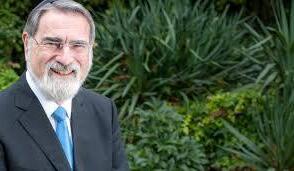
there is an answer to the question, why. Neither the universe nor human life is meaningless, an accident, a mere happenstance. As Freud, Einstein, and Wittgenstein all said, religious faith is faith in the meaningfulness of life.
Rarely is this shown in a more powerful light than in Va'etchanan. There is much in Judaism about what: what is permitted, what forbidden, what is sacred, what is secular. There is much, too, about how: how to learn, how to pray, how to grow in our relationship with God and with other people. There is relatively little about why.
In Va'etchanan Moses says some of the most inspiring words ever uttered about the why of Jewish existence. That is what made him the great transformational leader he was, and it has consequences for us, here, now.
To have a sense of how strange Moses’ words were, we must recall several facts. The Israelites were still in the desert. They had not yet entered the land. They had no
22 TORAH TIDBITS 1526 / VA'ETCHANAN
May the learning of these Divrei Torah be תמשנ יוליעל HaRav Ya'akov Zvi ben David Arieh zt"l
COVENANT & CONVERSATION
THOUGHTS ON THE WEEKLY PARSHA תומשנ יוליעל ה״ע רטרש קחצי תב הינעמו בייל הירא ןב לאירזעו ה״ע זייא דוד לארשי תב הדלוגו רשא בקעי ןב סחנפ Mazal Tov to Aryeh Koenigsberg on his 60th Birthday from Lisa and Family
RABBI LORD JONATHAN SACKS ZT"L Former Chief Rabbi of the United Hebrew Congregations of the Commonwealth
military advantages over the nations they would have to fight. Ten of the twelve spies had argued, almost forty years before, that the mission was impossible. In a world of empires, nations and fortified cities, the Israelites must have seemed to the untutored eye defenceless, unproven, one more horde among the many who swept across Asia and Africa in ancient times. Other than their religious practices, few contemporary observers would have seen anything about them to set them apart from the Jebusites and Perizzites, Midianites and Moabites, and the other petty powers that populated that corner of the Middle East.
Yet in this week’s parsha Moses communicated an unshakeable certainty that what had happened to them would eventually change and inspire the world. Listen to his language:
Ask now about the former days, long before your time, from the day God created human beings on the earth; ask from one end of the heavens to the other. Has anything so great as this ever happened, or has anything like it ever been heard of? Has any other people heard the voice of God speaking out of fire, as you have, and lived? Has any god ever tried to take for himself one nation out of another nation by miracles, signs and wonders, by war, by a mighty hand and an outstretched arm, or by great and awesome deeds, like all the things the Lord your God did for you in Egypt before your eyes? (Deut. 4:32-34)
Moses was convinced that Jewish history was, and would remain, unique. In an age of empires, a small, defenceless group had been liberated from the greatest empire of all by a power not their own, by God
Jerusalem Real Estate is My Business
Eta: 054-723-3863
Amazing stand alone homes in OLD KATAMON, TALBIYA, BAKA, GERMAN COLONY

OLD KATAMON 80 sqm with 2 bedrooms and 2 baths, one flight up with elevator. Completely renovated with terrace that opens into a sukka. Full of light & surrounded by greenery. Very quiet. 4,200,000 NIS
Shmuel border of OLD KATAMON. 139.7 sqm & registered terrace 123 sqm. 1st floor 3 beds & two baths. Central air, underfloor heating, parking area. Very light. 6,000,000 NIS
OLD KATAMON, Moshava
Bldg. 74 sqm, two beds, 2 baths & 2 terraces. 3rd floor great views. Available immediately. 2 elevators, underground parking. 24/7 doorman. 3,650,000 NIS
In BAKA, most sought out location. New apartment duplex of 236 sqm plus 81 sqm of outdoor space. Plus parking. For more info call Eta: 0547233863
ARNONA. Fantastic garden apartment for sale on Lupo Street. 175 sqm 6 rooms 4 bedrooms and 3.5 baths. Extra office downstairs. 60 sqm garden. Storage room. Parking. 8,500,000 NIS
MEKOR HAIM 100 sqm with 3 bedrooms and 2 full bathrooms, registered parking and sukka terrace.




Shabbat elevator
Price 3,850,000 NIS
Eta Morris Realty, Ltd.

etamorrisrealestate@gmail.com
Eta: 054-723-3863
etamorrisrealty.co.il

OU ISRAEL CENTER 23
Rehov Aluf Simhoni Kiriat
Himself. That was Moses’ first point: the singularity of Jewish history as a narrative of redemption.
His second was the uniqueness of revelation:
What other nation is so great as to have their gods near them the way the Lord our God is near us whenever we pray to Him? And what other nation is so great as to have such righteous decrees and laws as this body of laws I am setting before you today? (Deut. 4:7-8)
Other nations had gods to whom they prayed and offered sacrifices. They too attributed their military successes to their deities. But no other nation saw God as their sovereign, legislator, and law-giver. Elsewhere law represented the decree of the king or, in more recent centuries, the will of the people. In Israel, uniquely, even when there was a king, he had no
Meir
077-2050015
052-2678749
Meir Golan

Old Katamon: 4-room apartment in a small and quiet street, 101 sqm, renovated, very bright and airy, master bedroom, Safe room (mamad), sukkah balcony, view, elevator, 3,400,000 NIS Old Katamon: 4-room apartment, 90 sqm, well split, bright, airy, sukkah balcony facing a magnificent panoramic view, 3 exp Shabbat elevator, parking,
legislative power. Only in Israel was God seen not just as a power but as the architect of society, the orchestrator of its music of justice and mercy, liberty and dignity.
The question is why. Toward the end of the chapter, Moses gives one answer: “Because He loved your ancestors and chose their descendants after them.” (Deut. 4:37). God loved Abraham, not least because Abraham loved God. And God loved Abraham’s children because they were his children and He had promised the patriarch that He would bless and protect them.
Earlier though Moses had given a different kind of answer, not incompatible with the second, but different:
See, I have taught you decrees and laws as the Lord my God commanded me … Observe them carefully, for this is your wisdom and understanding in the eyes of the nations, who will hear about all these decrees and say, “Surely this great nation is a wise and understanding people” (Deut. 4:5-6).
BAKA: 4 room apartment, 85m, elevator, neat & nice apartment. 2,850,000 NIS
RASCO: new 4 room apartment, 95m, master suite, elevator, balcony, very nice view 2,950,000 NIS
Old Katamon: Spacious 3-room apartment in a very quiet street, 75 sqm, sukkah balcony facing a green and pastoral view, 3 exp. Shabbat elevator, private parking storeroom, 2,690,000 NIS
ARNONA: 4-room apartment, 90m, beautifully renovated, master suite, balcony, storage, Shabbat elevator, private parking 3,250,000 NIS
ARNONA: 4-room apartment, 90m, master suite, balcony, storage, Shabbat elevator, private parking. 3,250,000 NIS
BAKA: New 4 room apartment in a new building, 88m, master suite, storage, Shabbat elevator, private parking. 3,900,000 NIS
BAKA: New 4 room apartment in a new building, 88m, master suite, storage, Shabbat elevator, private parking, 3,950,000 NIS
RECHAVIA: 4-room apartment, 92m, Suka balcony, Shabbat elevator, fully accessible, private parking, storage 4,400,000 NIS
ARNONA: 5-room apartment, 108m, balcony, nice view, Shabbat elevator, fully accessible, private parking, storage. 4,000,000 NIS
ARNONA: 5-room apartment, 120m, balcony, elevator, fully accessible, private parking, storage 4,350,000 NIS
RASKO: New 4-room penthouse apartment, 115m, beautiful terraces for a lovely panoramic view, elevator. 4,250,000 NIS
Why did Moses, or God, care whether or not other nations saw Israel’s laws as wise and understanding? Judaism was and is a love story between God and a particular people, often tempestuous, sometimes serene, frequently joyous, but close, intimate, even inward-looking. What has the rest of the world to do with it?
BAKA: 5-room garden apartment, 140m, master suite private parking, storage, full of light, nice garden, 6,000,000 NIS
TALBIYA: 4-room apartment, 95m, sukkah balcony, 2nd floor. 5,200,000 NIS

OLD KATAMON: 5-room apartment, 127m, master suite, balcony, private parking, storage, full of light. 5,500,000 NIS
OLD KATAMON: Spacious new 5-room apartment, 140m, terrace, underfloor heating, Shabbat elevator, 2 parking, 6,300,000 NIS
FOR RENT:BAKA: nice 4-room apartment, 82m, beautifully renovated, master suite, air conditioners, balcony, second floor, elevator - fully accessible, storage, 8,000 NIS
OLD KATAMON: Spacious new 5-room apartment in a new project, 140m, terrace, underfloor heating, Shabat elevator, 2 parking. 6,300,000 NIS
24 TORAH TIDBITS 1526 / VA'ETCHANAN
But the rest of the world does have something to do with it. Judaism was never meant for Jews alone. In his first words to Abraham, God already said, “I will bless those who bless you, and those who curse you, I will curse; through you all the families of the earth will be blessed” (Gen. 12:3). Jews were to be a source of blessing Golan
golanechasim@gmail.com
3,290,000 NIS
to the world.
God is the God of all humanity. In Genesis He spoke to Adam, Eve, Cain, Noah, and made a covenant with all humankind before He made one with Abraham. In Egypt, whether in Potiphar’s house, or prison, or Pharaoh’s palace, Joseph continually talked about God. He wanted the Egyptians to know that nothing he did, he did himself. He was merely an agent of the God of Israel. There is nothing here to suggest that God is indifferent to the nations of the world.
Later in the days of Moses, God said that He would perform signs and wonders so that “The Egyptians will know that I am the Lord” (Ex. 7:5). He called Jeremiah to be “a prophet to the nations.” He sent Jonah to the Assyrians in Nineveh. He had Amos deliver oracles to the other nations before He sent him an oracle about Israel. In perhaps the most astonishing prophecy in Tanach, He sent Isaiah the message that a time will come when God will bless Israel’s enemies:
“The Lord Almighty will bless them, saying, ‘Blessed be Egypt My people, Assyria My handiwork, and Israel My inheritance’” (Is. 19:26).
God is concerned with all humanity. Therefore what we do as Jews makes a difference to humanity, not just in a mystical sense, but as exemplars of what it means to love and be loved by God. Other nations would look at Jews and sense that some larger power was at work in their history. As the late Milton Himmelfarb put it:
Each Jew knows how thoroughly ordinary he is; yet taken together, we seem caught up in things great and inexplicable...The number of Jews in the world is
smaller than a small statistical error in the Chinese census. Yet we remain bigger than our numbers. Big things seem to happen around us and to us.4
We were not called on to convert the world. We were called on to inspire the world. As the prophet Zechariah put it, a time will come when “Ten people from all languages and nations will take firm hold of one Jew by the hem of his robe and say, ‘Let us go with you, because we have heard that God is with you’” (Zech. 8:23). Our vocation is to be God’s ambassadors to the world, giving testimony through the way we live that it is possible for a small people to survive and thrive under the most adverse conditions, to construct a society of law-governed liberty for which we all bear collective responsibility, and to “act justly, love mercy, and walk humbly”5 with our God. Va'etchanan is the mission statement of the Jewish people.
And others were and still are inspired by it. The conclusion I have drawn from a lifetime lived in the public square is that non-Jews respect Jews who respect Judaism. They find it hard to understand why Jews, in countries where there is genuine religious liberty, abandon their faith or define their identity in purely ethnic terms.
Speaking personally, I believe that the world in its current state of turbulence needs the Jewish message, which is that God calls on us to be true to our faith and a blessing to others regardless of their faith. Imagine a world in which everyone believed
OU ISRAEL CENTER 25
4. Milton Himmelfarb and Gertrude Himmelfarb. Jews and Gentiles. New York, Encounter, 2007, p. 141.
5. Micah 6:8.
this. It would be a world transformed.
We are not just another ethnic minority. We are the people who predicated freedom on teaching our children to love, not hate. Ours is the faith that consecrated marriage and the family, and spoke of responsibilities long before it spoke of rights. Ours is the vision that sees alleviation of poverty as a religious task because, as Maimonides said, you cannot think exalted spiritual thoughts if you are starving or sick or homeless and alone.6 We do these things not because we are conservative or liberal, Republicans or Democrats, but because we believe that is what God wants of us.
Much is written these days about the what and how of Judaism, but all too little about the why. Moses, in the last month of his life, taught the why. That is how the greatest of leaders inspired action from his day to ours.
If you want to change the world, start with why.
Around the Shabbat Table:
Why does Moshe choose to explain the ‘why’ of Judaism here, at this point in the Torah?
If you wanted to sum up all of Judaism in a brief mission statement, what would you say?
Do you think Judaism and the Jewish people are making an impact on the world today? How?
6. The Guide for the Perplexed, III:27.
These weekly teachings from Rabbi Sacks zt”l are part of his ‘Covenant & Conversation’ series on the weekly Torah teaching. With thanks to the Schimmel Family for their generous sponsorship, dedicated in loving memory of Harry (Chaim) Schimmel. Visit www.RabbiSacks.org for more.
In the heart of calm and pastoral BAKAPrivate arab house, 6 rooms, 500m + possibility of building 250m, huge garden, approx. 700m, completely renovated, underfloor heating + a/c, large parking, 5 bathrooms, 5 toilets, green
In the heart of calm and pastoral BAKAPrivate arab house, 6 rooms, 500m + possibility of building 250m, huge garden, approx. 700m, completely renovated, underfloor heating + a/c, large parking, 5 bathrooms, 5 toilets, green
MENDEL 0528980111
MENDEL 0528980111
BAKA - New penthouse, 4 rooms in a small luxurious building with character, alone upstairs, 3rd floor + elevator, 4 orientations, 3 toilets, 2 bathrooms, terrace / sukkah, 70m, parking, store-room
BAKA - New penthouse, 4 rooms in a small luxurious building with character, alone upstairs, 3rd floor + elevator, 4 orientations, 3 toilets, 2 bathrooms, terrace / sukkah, 70m, parking, store-room
5390000 NIS MENDEL 052-8980111
5450000 NIS MENDEL 052-8980111
BAKA / MEKOR HAIM – 4 rooms, 90m, 2nd floor + elevator, renovated by architect, fireplace, a/c, very central, close to all amenities
MOSHAVA / In a building after TAMA 38, new apartment, 4 rooms, 3rd floor + elevator, balcony/partial sukah, opened sight, 2 bathrooms, calm, parking

MENDEL 052-8980111
MENDEL 052-8980111
TALBIEH – 95m, elevator, very well kept, bright, in the corner of building, 3 orientations, accessible
BAKA / MEKOR HAIM - 4 rooms, 90m, 2nd floor + elevator, completely renovated, fireplace, a/c, gas heating, very central, close to all amenities
3100000 NIS MENDEL 052-3202488
MENDEL 052-8980111
ADAM st. close to Arnona Hatzeira, in a step building, very spacious 5 rooms + terrace, 40m, open view, renovated, private entrance, quiet, potential of adding extra unit, 3450000 nis
Near Arnona Hatzaira, in a step building, very large 5-room apartment + balcony/sukkah, 40m, renovated, 3rd floor, private entrance, quiet, potential for extra independent unit
MICHAEL 052-3202488
MICHAEL 052-3202488
ARNONA – 3 rooms, that will be transformed to 90m, 3rd floor with elevator, store-room, parking
In a small and pastoral street in the heart of BAKA - Penthouse/Duplex 5 rooms, terraces, 15m + balcony, 6m, 2nd and 3rd floor + elevator, 3 orientations, parking
ONLY 2550000 NIS
MICHAEL 052-3202488
MICHAEL 052-3202488
In the pastoral BAKA - quiet and central, stunning villa 350m, in a magical atmosphere, designed, pool, 4 bedrooms, cinema room and more, 4 bathrooms, garden, parking
BAKA a stunning 3 story house on a quiet and pastoral cul-de-sac, very high end designed, swimming-pool, large wrap around garden, parking
MIKAEL 052-3202488
MICHAEL 052- 3202488
ARNONA HATZEIRA - Very spacious penthouse, 120m, 4th floor + elevator, huge terrace / succah, 75m, open view, 2 parking spaces, cellar, 3 toilets, quiet, completely renovated, immediate entrance
ARNONA HATZEIRA - Very spacious penthouse, 120m, 4th floor + elevator, huge terrace / succah, 75m, open view, 2 parking spaces, cellar, 3 toilets, quiet, completely renovated, immediate entrance
MICHAEL 052- 3202488
MICHAEL 052- 3202488
26 TORAH TIDBITS 1526 / VA'ETCHANAN


OU ISRAEL CENTER 27 Unbeatable deals and special benefits you can't miss! Join us for an exclusive sales event and treat yourself with our amazing offers. See you there! Exclusive Boutique Residence in Ramat Bet Shemesh Heh 3-4-5 Rooms Up to 3 Apartments per Floor Luxury Garden and Penthouse Apartments The simulation is for illustration only *8082 www.efi-natif.co.il NATIV IN NEVE SHAMIR תידוחיי םירוגמ תייווח Sales Office: 7 Shderot HaEmoraim Ramat Bet Shemesh *Terms & Conditions Apply* Boutique Residence Neve Shamir A Unique Opportunity in Ramat Bet Shemesh Special Sales Event! 7 Haamoraim St Beit Shemesh Friday, July 28 | 9:00 AM - 13:00 PM
PROBING THE PROPHETS
BY RABBI NACHMAN (NEIL) WINKLER Faculty, OU Israel Center

Rabbi Winkler's popular Jewish History lectures can be viewed by visiting the OU Israel Video archive: https://www.ouisrael.org/video-library
The haftarah for Shabbat Nachamu opens the “sheva d’n’chemta”, the seven post-Tish’a B’av haftarot with Yishayahu’s prophecies of comfort. It also marks the beginning of the second section of the sefer, the section of nechama , comfort. It should be no surprise to us that these messages of consolation are all found in Sefer Yishayahu who, despite some of his harsh words condemning and censuring Israel, is seen by Chazal as the prophet of comfort.
In fact, we actually refer to that fact in our tefillot quite frequently when reciting the Kaddish. How many of us are aware of the meaning of the words praising Hashem as being far beyond any praises we can hope to express. We describe G-d as “l’eylah min kol birchata v’shirata, tushb’chata” – Hashem is beyond any blessing ( birchata ) or songs of praise (v’shirata) or any accolades we may give Him (tushbechata). Interestingly, the Kaddish also adds the word v’nechemata” –which means comfort – a word that seems to be out of place in the lists of praises that are given. It would appear that the word of comfort was an addition for those mourners who recite the Kaddish during their period of aveilut.
Years ago, I was once taught that “v’nechemata” refers to Sefer Yishayahu and the solace and comfort it provides and based upon that teaching I was able to solve a question about this haftarah that
has bothered me for some time.
Hashem’s cry to His prophets to comfort Israel, “Nachamu, Nachamu Ami”, is followed by the charge of “Dabru al lev Yerushalayim v”kir’u ayleha” – to speak to the heart of Yerushalayim and call out to her”-but what need should there be to “speak to their hearts” and to call out to her? The nev’im would be proclaiming the most wonderful news to a downtrodden population – why would there be any need for these harbingers of good tidings to call out to the people or speak to their hearts? Would they not be rejoicing when they hear of the glorious future that awaits them? Would they not run to their prophets to hear of their approaching relief and salvation? Of what need could there be to convince the nation to accept the prophetic message of consolation?
The answer to that question actually appears in G-d’s very next words of instruction to his prophetic agents. He tells His nevi’im how to convince the disbelieving throngs by saying to them:”ki mal’ah tz’va’ah” – her ‘sentence’ of suffering is over, “ki nirtzah avonah” – her sin has been forgiven, “ kilak’cha miyad Hashem kiflayim b’chol chatoteha ” – for she has received two-fold (punishment) for her sins. Hashem understood that the people’s reluctance to believe the welcome news is simply because they could not believe it!!!
After witnessing the destruction of their
28 TORAH TIDBITS 1526 / VA'ETCHANAN
Holy Temple, after suffering exile from their land and after undergoing decades of persecution in the Diaspora, they simply could not believe that it was over. They didn’t feel that their sinfulness had merited redemption!
And after suffering centuries of blood libels, and experiencing the slaughter during the Crusades, and the Black Death, and the Inquisition, and the pogroms and the Shoah…are we surprised that many are still reluctant to see the Divine Hand and sense His call of “ Nachamu Nachamu Ami?”
It was G-d, therefore, who proclaimed: “ nirtzah avonah ”-your sin is forgiven! You have suffered too much – TWICE more than your sins deserved! Only the comforting words from Hashem – or His miraculous deeds– could bring true
comfort to the nation, true Nechama.
And this is precisely why our haftarah opens the haftarot and p’rakim of consolation, for it teaches us what actual nechama is: the knowledge that anything and everything is possible through G-d, and, therefore, trusting in that truth will bring the ultimate Nechama …and the final Geulah.
“


Nachamu, Nachamu Ami”
NACHI REALTY 054-461-3943
Great family apartment in the best part of Katamonim Spacious 4.5 rooms, 100m with a 9m Sukka mirpeset, one floor up, good shape, 4 exposures, newly renovated bathrooms. 3.37m shekel
New on the market in Ganei Tzion
Large 5 rooms, 120m, 2.5 baths, move in condition, Shabbat elevator, 2 parking spaces, storage room, 12m Mirpeset that is partial Sukka. 5.17m shekel
Great Deal in the best part of Har Choma
Right next to the Community Center, shopping & Shuls, 3 room spacious apartments with 2 bathrooms, Sukka mirpeset, Shabbat elevator, parking & storage, move in condition. 2.14m shekel
OU ISRAEL CENTER 29
RABBI SHALOM ROSNER
Importance of The Marital Relationship
In Parshat Va’etchanan we re-encounter the ten commandments. Rabbi Melamed (Simchat Habayit) notes that it is fascinating that immediately following the description of Matan Torah, Moshe instructs the people to return to their tents:

Go say to them, 'Return to your tents . (Devarim 5: 27).
The gemara (Avoda Zara 5.), interprets this pasuk to mean הנוע תחמשל - as referring to encouraging the men to be intimate with their wives. One would have expected that following this spiritual high of receiving the ten commandments and witnessing Har Sinai surrounded by fire and all the other miracles that transpired at this most uplifting event, that it be appropriate to instruct the men to return to the “tent” of the bet midrash and engage in the intricacies of the Torah. Why at this juncture are the men instructed to be with their wives?
Most other religions view intimacy in a negative light. The priests take a vow of celibacy. Judaism however, views a relationship between a husband and wife as holy. There are specific laws of taharat hamishpacha to ensure the purity of the
relationship. We are to sanctify the mundane and in particular the relationship between man and woman. The relationship between God and Am Yisrael is compared to that of a husband and wife. As is stated in Yeshayahu:
..and the rejoicing of a bridegroom over a bride shall your God rejoice over you. (Yeshayahu 62:5).
Shir Hashirim is an allegory comparing our relationship with God, to a relationship between man and woman. Although some scholars questioned whether to include Shir Hashirim as one of the 24 books of the Tanach, Rabbi Akiva referred to it as “kodesh Kodashim” (holy of holies).
The Torah tells us that a spouse is to serve as an “ezer Kenegdo”. What is the meaning of ezer kenegdo? It seems like a self-contradictory juxtaposition: An ezer is a help. Keneged means “opposite.” How can a spouse exemplify both attributes simultaneously?
The Netziv (Bereshit) suggests as follows. The opposition and tensions with one’s spouse are designed to help them. Sometimes, being opposites could be the greatest help. The greatest critic in the world should be our spouse, and we should be able to hear it from them, because we’re one. It is often hard to accept criticism, but if we are being criticized by a spouse, we should appreciate it. Knowing there is unconditional love and commitment, such criticism is only being
30 TORAH TIDBITS 1526 / VA'ETCHANAN
)זכ :ה םירבד( םֶכיֵלֳהאְָל םֶכָל וּבוּשׁ םֶהָל רֹמֱא ךְֵל
ךְִיָקלֱֹא ךְִיַלָע
ןָתָח שׂוֹשְׂמ ..
והיעשי(
שׂיִשָׂי הָלַּכּ־לַע
)ה:בס
Rav Kehilla, Nofei HaShemesh Maggid Shiur, Daf Yomi, OU.org Senior Ra"M, Kerem B'Yavneh
shared so we can improve ourselves. That partnership is true ezer kenegdo.
Together with our spouse we are able to establish the proper caring, warm and religious environment through which to transmit our mesorah (tradition). When our children witness Torah and acts of chesed in the home, they internalize its importance. Following Matan Torah- the most significant way to guarantee the transmission of the Torah to future generations is to ensure that healthy relationships are established in which children can be properly nurtured. May we constantly invest in our relationship with our spouse and do all we can to establish a healthy, loving and supportive environment in our homes that can serve as an example for our children and as a proper conduit through which to transmit our Torah values.



OU ISRAEL CENTER 31
Your Jewelry is Worth Gold! @Fancycolors vmkdiamonds.com vmk_diamonds Jewelry Manufacturer Upgrade your old Jewelry piece to a new modern design Best rate for broken and old gold pieces, inheritances Service in Hebrew | English | French | Italian Safe & Convenient Member of the Israel Diamond Exchange & the World Federation since 1997 Pay Cash 054-397-7707 Mishael Vardi
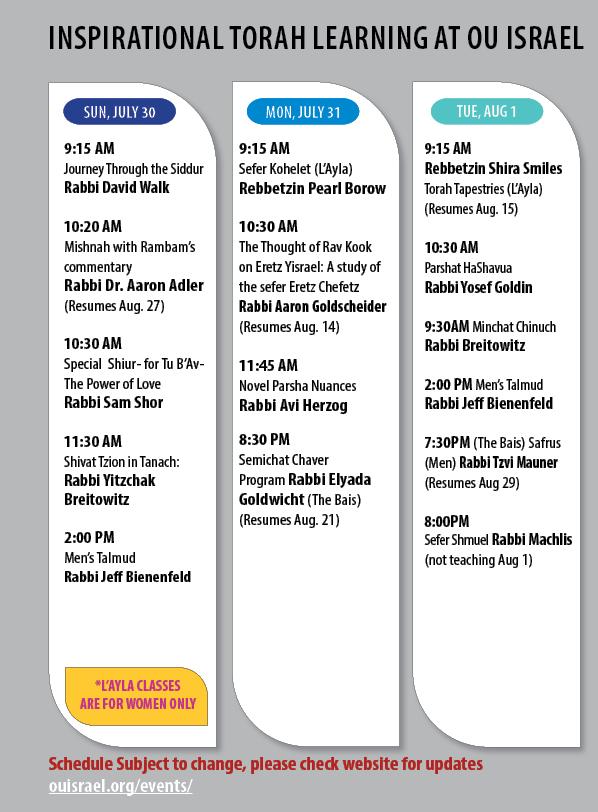
32 TORAH TIDBITS 1526 / VA'ETCHANAN
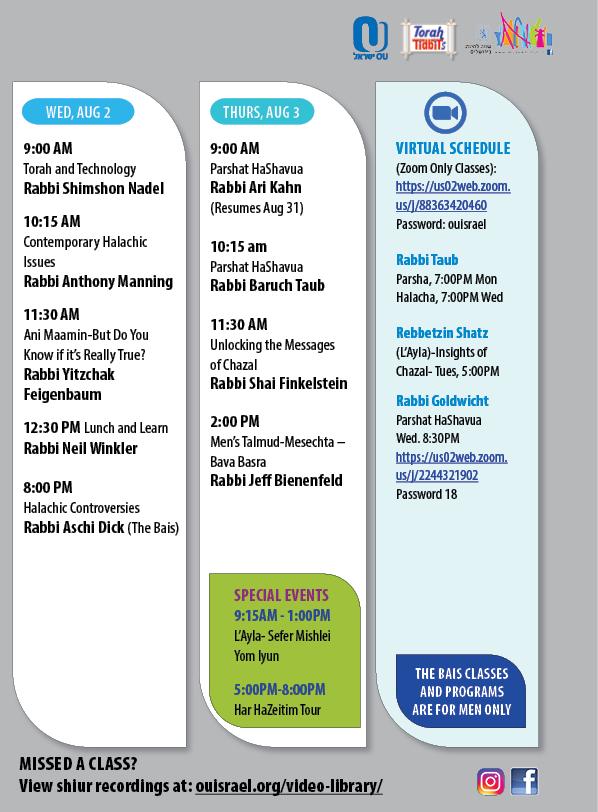
OU ISRAEL CENTER 33
it is as if G-d “re-gives” the Jews the Torah and the Jews re-receive it. Each time we learn Torah we are able to discover something new about the exact same words. It’s like we were all at Mount Sinai when the Torah was given, meaning it is every Jews responsibility to follow the Torah as if it was given specifically to him.
Before receiving the Torah at Mount Sinai, there were some Israelites that, of their own accord, already kept the entire Torah. Since this is the case, why is this day so important?
On the day of Matan Torah 2 things changed. Firstly the Jews gained a connection to Hashem. Hashem put his essence into the Torah so when he gave it to us both those that had and had not kept the Torah before were now keeping it because of this connection to Hashem’s essence.
Secondly, the Torah given at Mount Sinai is able to have an effect on the physical world whereas before Torah and mitzvot were considered strictly spiritual matters.
The Talmud (Shabbat 88b) states that when the Jews heard G-D’s divine voice, they all died from its intensity and afterwards G-d brought them back to life. I think this emphasizes why Hashem cannot be openly present in this world. For if he was, the Jews’ free will would no longer be preserved and we would follow Hashem in everything. If his awe and will were so apparent, we would be compelled to follow him without having a real choice.
JLIC at Tel Aviv University does amazing work in bringing Jews together and teaching us all about the torah we received at Mount Sinai. JLIC, I believe, helps us

The OU’s Jewish Learning Initiative on Campus (JLIC) is creating and nurturing vibrant religious communities in Israel to support English-speaking college students and young professionals. JLIC Israel’s goals include: building a warm and welcoming Jewish community for students and young professionals; providing engaging and dynamic Jewish education; providing a supportive home environment for Olim; providing resources for personal and religious growth, including personal mentoring, Aliyah support, religious guidance and leadership development. Current JLIC programs in Israel include: Reichman University - Herzliya; Bar Ilan University - Givat Shmuel; Tel Aviv University; Tel Aviv for Young Professionals; and Jerusalem. Contact: Rabbi Jonathan Shulman, Director of OU-JLIC in Israel shulmanj@ou.org
02-560-9125
4 rooms, 113m, 2 bathrooms, porch, 1st floor, elevator, 6.2 million NIS
Smadar 050-3114040 // 02-642-4329
GET FIT WHILE YOU SIT: Exercise for ladies Sundays 12:45-1:30pm at the OU Israel Center Sura Faecher 0504153239

smadi_bida@walla.co.il
PRI HADASH
WOMEN'S WRITING WORKSHOP AT THE OU ISRAEL CENTER

Monday mornings 10.30-12.30
For more details, call Ruth 02-628-7359 or Judy 054-569-0410
34 TORAH TIDBITS 1526 / VA'ETCHANAN OU ISRAEL CENTER 91
students see Hashem, even though he is hidden by the mask of nature and teaches us how to use our free will to bring Hashem into the physical world in whatever way we choose.
donated by Marion & Michael Silman Ita Rochel

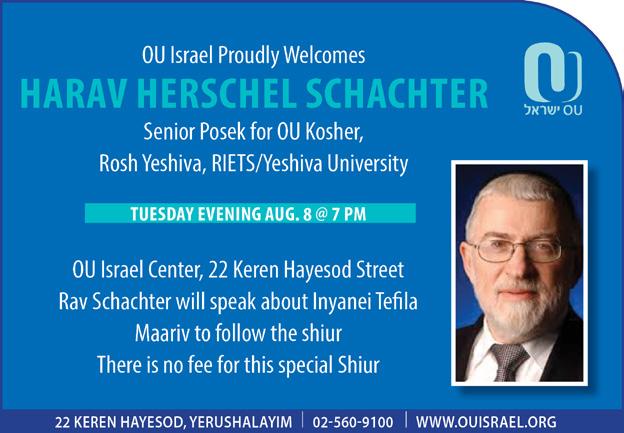
OU ISRAEL CENTER 35
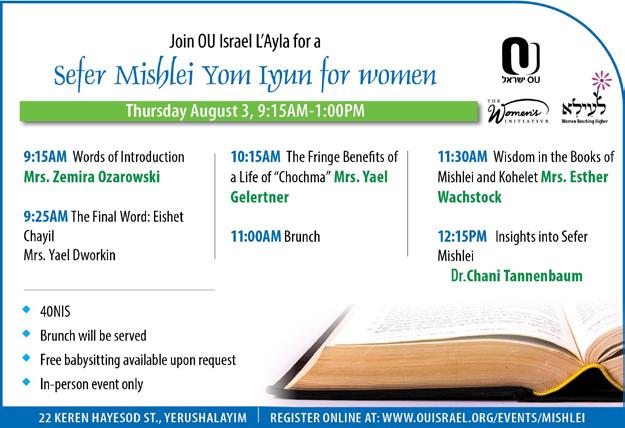

36 TORAH TIDBITS 1526 / VA'ETCHANAN
 SMILES Faculty, OU Israel Center
SMILES Faculty, OU Israel Center
Overcoming Obstacles
Although Moshe Rabbeinu implored Hashem 515 times to enter the Land of Israel, the response was an unequivocal “no.” Hashem tells Moshe, “Rav lachEnough!” Do not ask further! What can we learn from this exchange between Moshe and Hashem?
Many commentators extrapolate a fundamental lesson from this phrase. Moshe only stopped his petitionary prayer because of Hashem’s command. We learn from Chazal that tefilah stands in the highest of places, if only we would appreciate its power! We first find this concept at the beginning of Creation. The Garden of Eden was devoid of all plant life and vegetation until Adam came and prayed for the necessary rain to enable the garden to flourish. In Shearim B’tfilah, Rav Pincus writes that any blessing that comes to a person is a result of tefilah. Even when Hashem made a promise, i.e., that Yitzchak Avinu would be the progenitor of the Jewish people, he and his wife Rivka still needed to daven to have children. It is our tefilah that actualizes all potential good in the world.
Tefilah is also a medium through which a negative decree can be canceled and instead, bring goodness in its wake. Rav
Biderman in Be’er Hachayim notes that this aspect of tefilah explains an anomaly that we find in the kiddush and tefilah of Rosh Hashanah. In the Rosh Hashanah liturgy, the holiday is described as, “Zecher l’yetziat Mitzrayim - a remembrance of the Exodus from Egypt.” Obviously, this can’t be understood literally since Rosh Hashanah celebrates the creation of the world which happened long before the Exodus. Rather, he explains, that just like there was a decree for the Jewish people to be enslaved in Egypt for 400 years yet, through Am Yisrael’s cries of tefilah they were able to reduce the decree by 190 years, so too, we can harness our power of tefilah to change any personal decrees that may be made against us. Indeed, in Parashat Ve’etchanan we are taught, “Ki mi goy gadol asher lo Elokim kerovim eilav ka’Hashem Elokeinu bechol kar-ainu eilav – What nation is so great that they have G-d close to it, as Hashem our G-d is, whenever we call Him?” (Devarim 4:7) It is our special gift to have Hashem’s attention so accessible at all times!
Rav Yerucham Levovitz in Da’at Torah notes that this need to be persistent in our tefilah applies especially in all areas of our spiritual growth. Although there may be impediments along the way, we cannot allow them to deter us from achieving our spiritual goals and visions. The well-known Midrash describes how Avraham Avinu encountered the Satan in numerous guises trying to stop
38 TORAH TIDBITS 1526 / VA'ETCHANAN REBBETZIN SHIRA
him on his way to take his son Yitzchak to the Akeidah, yet Avraham Avinu would not be discouraged. Upon naming her son Naftali, Rachel Imeinu also expresses this idea of how much she struggled and davened and was rewarded for her efforts.
The Da’at Shraga explains that this is one reason why the Mishnah states, “Hevei ratz ka’zvi - be swift as a deer” to do the will of Hashem. (Avot 5:20) Really a gazelle is a faster animal, why does the Mishnah then specify the deer? A deer is unusually persistent, when it sees an obstacle, it tries to figure out a way to overcome it, go around it, or somehow surmount it. Other animals just turn back. We must assume this trait of the deer; never give up when trying to achieve a higher spiritual purpose. (An interesting reflection: This is perhaps why the names Naftali and Zvi are often found together, even though one is not a translation of the other, like Dov Ber. Conceptually they are linked, expressing the idea of perseverance.)
From these two words “Rav lach,” we learn that this experience was unique only to Moshe Rabbeinu. We are not told it is never, ever enough. We must daven continuously and determinedly in pursuit of that which we strive for. May all our tefilot be answered le’tovah.
DOROT - The OU Women's Intergenerational Choir
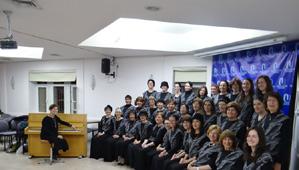
Director Hadassah Jacob 052-384-7230
Monday Evenings 7:00 - 9:00pm
Resumes Sept 4th
SHIUR SPONSORS
TUESDAY, JULY 25TH - Mrs. Sylvie Schatz's Zoom Shiur was sponsored on the 19th yahrzeit of Asna bat R' Schneur on 8 AvShe personified Ahavat Chinam.
Beloved mother of Shelley Hirshberg & Helen Raff Scher, and beloved grandmother- always remembered with love
WEDNESDAY, JULY 26TH - Rabbi Feigenbaum's Shiur is sponsored in loving memory of Aaron ben Meshulam z"l on his 18th yahrzeit
Rabbi Goldscheider’s Shiur has been sponsored for the 2023 Academic Year

Rebbetzin Shira Smiles Shiur is sponsored for the 2023 academic year by Dr. & Mrs. Menachem Marcus in memory of their parents, Rose & Dr. Emanuel Marcus z”l -
ל”ז סוקרמ השמ ןב יכדרמו ריאמ ףסוי תב לזייר Rosi and Ernest Strauss z”l -
ל”ז סוארטש דוד ןב לאינדו םהרבא תב דומיל
Rabbi Breitowitz’s Tuesday ShiurMinchat Chinuch is sponsored for the academic year 2023 by Rabbi Refoel & Sharon Auman in memory of their parents Edith & Reiner Auman z”l
ד”יה לאפר תב ה”ע רתסאו ל”ז קודצ ןב הנוי and their son Rabbi Shmuel Eliyahu Auman z”l
י”נ לאפר ברה ןב ל”ז והילא לאומש ברה
Rabbi Goldin’s Shiur
is sponsored for the 2023 academic year by Dr. & Mrs. Menachem Marcus in memory of beloved aunts Irma Haas a”h and Hilde Myer a”h
Rabbi Manning’s Shiur
has been sponsored for the 2023 academic year
ל’’ז ןמלק ןב גילזו ה’’ע תידנרב
Rabbi Taub’s Weekly Thursday
Parshat HaShavua Shiur
is sponsored by The Jewish Legacy Foundation


OU ISRAEL CENTER 39
ל’’ז המלש ןב בוט םשו ה’’ע םהרבא תב םירמ תמשנ וליעל
תמשנ יוליעל
תב הנרב
053-‐427-‐6363 CINEMA
CITY
MALL,
JERUSALEM ArthurMSamuels@gmail.com PODIATRIST Over
30
years
experience Arthur
Samuels,
DPM Licensed in Israel & America CINEMA CITY MALL, JERUSALEM
Mashpiah, OU-NCSY Executive Director, Camp HASC Author of Baderech: Along the Path of Teshuva (Mosaica 2021)

Nachamu: Lift Our Burdens
Rav Daniel Movshovitz, HY”D, was the menahel of the Talmud Torah of Kelm. He was an embodiment of mussar , refinement, greatness in Torah, faith, straightforward yashrus, and nobility in midos — a portrait of sheleimus. He was a son in law of Rav Nochum Zev Ziv, scion of the glory of Kelm. When Rav Simcha Zissel Broide, zt’l, the Chevron Rosh Yeshivah, shared memories of Rav Movshovitz, he sighed, “His face shined bright… There was a unique kind of clarity and exalted feeling in his discourses that lifted us up and transported listeners to a different world.”
Rav Elchonon Wasserman HY”D always made a point of spending the Yomim Noraim in Kelm, leaving his own yeshivah to daven in what he felt to be the headquarters of tefillah in all of Europe. Beyond the exalted tefillah and the intensive, high level study of Torah, one emphasis of the particular derech avodah of Kelm was being nosei be’ol im chavero, “sharing the burden and suffering of a fellow Jew”.
Rav Movshovitz was fahrhering a potential talmid interested in joining the Talmud Torah in Kelm, testing his
abilities in learning, asked the young man which midah or character trait he sought to develop and refine. “I am striving to become someone who is nosei be’ol im chavero.” Rav Movshovitz smiled, responding with a humble smile, “You are way ahead of me… I envy you! I’m still trying to make myself aware that there is a “chavero”, someone other than myself with a burden that I must share!”
Rav Efraim Oshry, zy’a, the heroic poseik and leader who chronicled annihilation of Lithuanian Jewry, was a master of mesirus nefesh and devotion to Torah in the worst of times. In his book of responsa, Mima’amakim , concludes his essay on the destruction of Kelm with the lament, “Kelm, Kelm! Where is the poet that can portray the beauty of your life? Who is qualified to sing the song of the purity of your death?”
In June 1941, Nazi forces entered Kelm and together with their willing collaborators, decimated the city. Rav Movshovitz was martyred with his family, students and community, and buried in a mass grave in the fields of the Grozhebiski farm. Rav Movshovitz’s esteemed brother in law, Rav Eliyahu Eliezer Dessler shares a heart wrenching account and reflection on “The Martyrdom of the Kelm Yeshivah” in Sefer Michtav Me'Eliyahu:
HaKadosh Baruch Hu had a corner in
40 TORAH TIDBITS 1526 / VA'ETCHANAN
JUDAH MISCHEL
RABBI
Teens Celebrate the
of Connection at TorahNoar Unity Conference
AsIsraeli society grapples with deep-seated divisions, a beacon of unity emerged this week on July 18, the eve of Rosh Chodesh Av, when a lively crowd of thousands of teens from across the country gathered at Binyanei Hauma to take part in an energy charged Unity Conference, billed “Aderaba.”

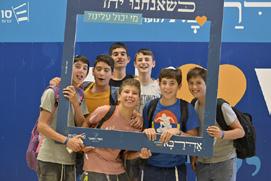
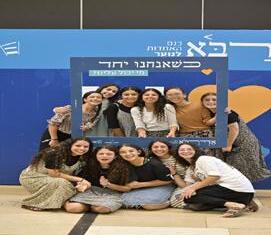
The Aderaba conference was the initiative of Sulamot, founded by the Chief Rabbi of Gush Etzion, Rav Yosef Zvi Rimon, and the Rothenberg Family Foundation, founded by Robbie Rothenberg. Rav Rimon, who also penned a special prayer for unity, to be recited in synagogues this Tisha B’Av, expressed his aspiration that the teens absorb the positive messages and leave the conference as “unity ambassadors.”
Power
extraordinary bond they’ve cultivated despite holding polarizing political beliefs. At the panel discussion, Rabbis Yigal Levenstein and David Stav, both leaders with differing perspectives within the national religious community, showcased how dialogue and healthy disagreement can be achieved with respect and dignity.
Each session buzzed with energy, filled with enthusiastic, engaged youngsters who listened raptly and responded with insightful questions. Many are regular participants in Sulamot’s 40+ TorahNoar batei midrash, which advocate youth-led, youth-focused learning programs every motza’ei Shabbat.
Speakers included rabbis, educators, activists and public figures, such as Rabbi Eitan Shnerb, Bat Galim Shaer, former IDF commander Ziv Shilon, journalist Yisrael Meir and more. In one memorable session, Michael Edri, an altruistic organ donor who is religious, stood on stage with the recipient of his kidney, Aviram Fidel, a secular Jew with left-wing views. The two discussed the
The highlight of the conference was the mega-event, featuring artist Akiva Turgeman, who delivered a power-packed performance with songs that were both somber and hopeful. After an emotionally stirring video interview with Rabbi Leo Dee, a grieving husband and father to terror victims, Lucy Maia and Rina, Hy”d, Rabbi Dee took to the stage in person. He exhorted the youth to engage in ahavat chinam, specifically at this time, on the eve of the mourning period for the Beit Hamikdash and as Israeli society experiences one of its most divisive periods. This conference, he said, “sends the message that the Jewish people need right now – one of tolerance, understanding and love.”
OU ISRAEL CENTER 41
Submitted and paid for by Aderaba
His world…where people went about life unobtrusively together with Hashem; a small town called Kelm…a holy and awe-inspiring place, whose each and every corner radiated with the splendor of the light of truth. Those who knew, always said, “This holy house will stand forever, until the Redeemer arrives”...but this did not happen. Once the fearsome decree of destruction had been made, it did not endure… Even the Beis haMikdash itself didn't continue standing, so how could a mikdash in the Diaspora remain intact?
Yet, the destruction of this house was unlike the destruction of all the rest. Not all demises are the same… The deaths of men of truth are different. The whole idea of destruction has no relevance to them. Their outer covering falls away but their inner content continues to live and endure, since it is “a portion of Hashem above.” The very outermost layer…drops away, but whatever was imbued with holiness, ascends Heavenward; it is no longer a raiment because there is holiness in it. It was and it remains holy and eternal.
Years before the outbreak of the war, Rav Movshovitz composed a letter sharing words of tanchumin, consolation, to his brother-in-law Rav Dessler upon the passing of his father, Rav Reuven Dov, zt”l:
Perhaps we can explain the (traditional words of consolation used in nichum aveilim) םילשוריו ןויצ ילבא ראש ךותב, “among the mourners of Tziyon and Yerushalayim”, according to the words of Tehillim: ןויצ תביש תא ׳ה בושב תולעמה ריש םימלוחכ ונייה, “A Song of Ascents: When Hashem returns the captives of Zion, we
will be like dreamers….” This means that the yeshuah , salvation and nechamah should be so great that there will be no more memory of the troubles; they will be like a bad dream, a fleeting nightmare.
And moreso: it will be revealed that the troubles themselves were an essential reason for the salvation. As we say in the Amidah, העושי חימצמו היחמו תיממ ךלמ, the King who brings death and restores life, and causes salvation to spring forth.” Hashem is the One Who both brings death and restores life, so that the yeshuah can spring forth from within the pain and suffering itself. This means that the comfort of Tziyon and Yerushalayim…is that there will be a true and complete nechamah for all who are brokenhearted, because all will be redeemed; all loss will be restored, and everything will be returned to a state of wholeness…”
“Nachamu, nachamu ami….” Being among ami, our people, and knowing that we are not alone, is the deepest consolation. May we be among those who let others know that they are not alone, and may we lift and carry one another’s burdens…and set them down before the One Who restores life.
KNOW WHAT TO ANSWER


42 TORAH TIDBITS 1526 / VA'ETCHANAN
FREE COUNTER-MISSIONARY: Videos • Weekly Insights • Booklets • Counseling
Rabbi Bentzion Kravitz • info@JewsforJudaism.org


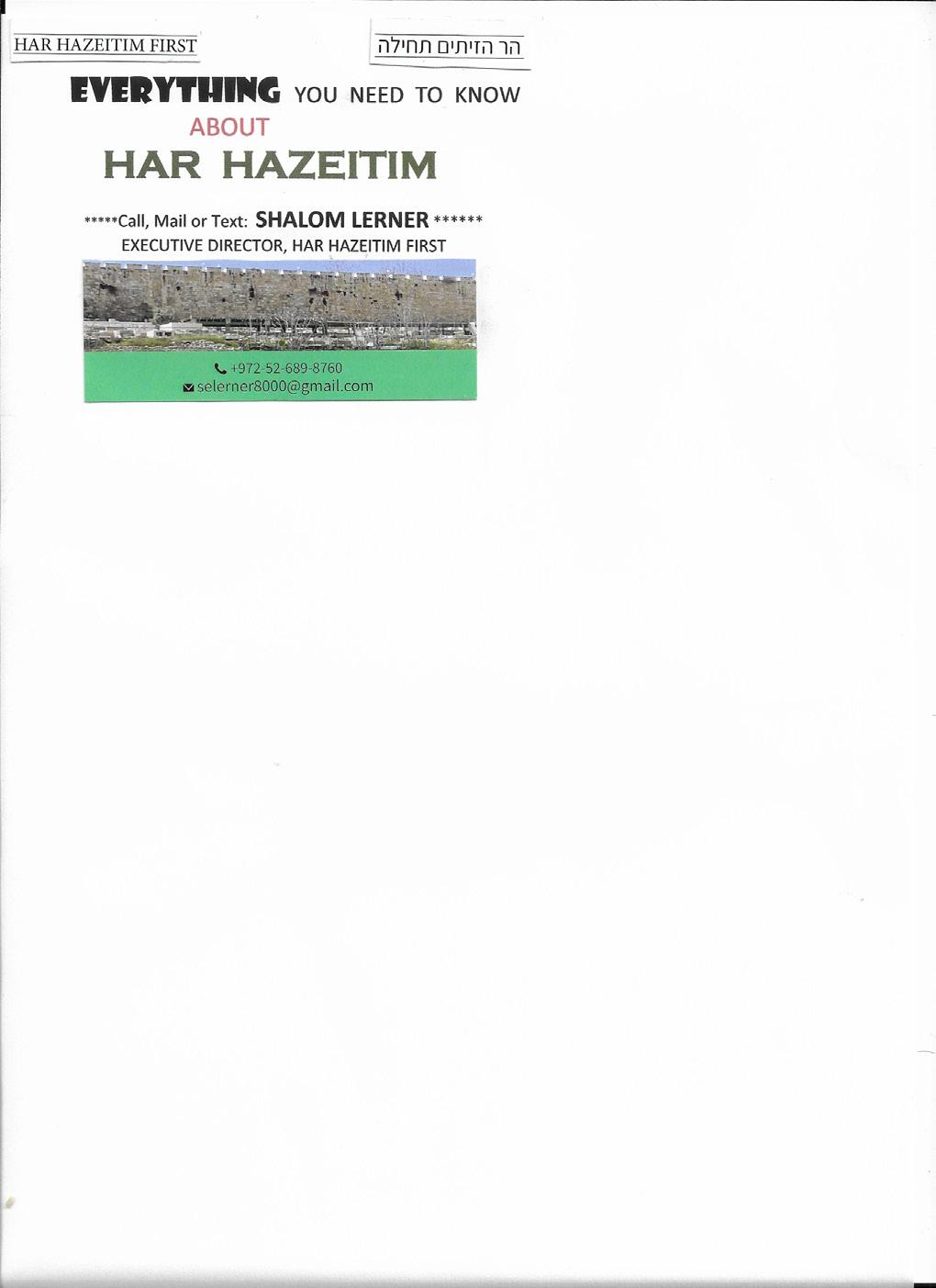
DRAMA BIBLE HORROR COMEDY HOLOCAUST Find them all in by Yaacov Peterseil Azazel and Other Jewish Stories Pomerantz Book Store 02 623-5559 SherlockS Hats 02 563-7155 The Israel OU Center A V A I L A B L E A T : Choose the genre you love. WHAT ’S YOUR GENRE?
BY RABBI MOSHE TARAGIN R am, Yeshivat Har Etzion
A World of Hashem "Echad"
Keriyas shema is composed of three Torah sections which, together, comprise a synopsis of Jewish belief. Keriyas Shema may be dubbed the constitution of Jewish faith.
The first section of Shema, lifted from parshat Va'etchanan outlines several basic theological tenets including the proclamation that Hashem is "echad". The term echad refers, primarily, to Hashem's exclusivity, as there are no other beings or gods with independent authority. In fact, the only other being in the entire universe with independent will is Man, who received it as a divine endowment. No other being enjoys free will, and, certainly, no other being possesses divine-like authority. As Hashem alone possesses authority, He is the exclusive "One".
A PRAYER
In his comments to Va'etchanan, Rashi introduces an additional concept to be contemplated while reciting the term echad. In addition to declaring the divine trait of exclusivity, we also pray for the era in which Hashem will be universally
acknowledged. Until all of humanity embraces Him, His Oneness or echad-ness is incomplete.
Rashi's comments add a layer to our Shema kavana: in addition to announcing a theological truth, we also pray for a redemptive future in which that truth will be commonplace.
Yearning for this redemptive era is integral to our theological belief. If we don’t crave a world which embraces Hashem, our own endorsement of Hashem echad is deficient. If we deeply care about Hashem’s presence in our world, we can't help but long for others to share in this belief. If we believe in "echad", we also long for universal knowledge of "echad".

The evolution of this era of universal acceptance of “Hashem echad” is gradual. As history unfolds, various historical developments augment Hashem echad, while other events diminish that awareness. Here are four indices by which we gauge the march toward Hashem echad.
STATE OF RELIGION
Religious shifts have dramatically impacted the state of Hashem echad . Religious imagination was once mired in a dark and backward world of pagan ritual and black magic. Humanity could not wrap its head around the concept of a one God, fundamentally different from our physical reality and without any human reference points. They worshipped idols
44 TORAH TIDBITS 1526 / VA'ETCHANAN GEULAS YISRAEL
fashioned by their own hands and forged by their own limited imaginations. Thankfully, our world has shifted away from idolatry, toward monotheism, and toward a general belief in a transcendent God, who is unlike any other being. Obviously, non-Jewish monotheistic religions still bear significant corruptions and imperfections, but they are still major advances over the dark paganism of antiquity.
On the other hand, over the past 500 years, the scientific revolution has secularized society, thereby diminishing religious interest. Inhabiting a frightening and unpredictable world, the ancients looked to gods for support and for security, in their hopes of stabilizing their shaky existence. In their incessant search for “the Other” they lived religion robustly and persistently.
The scientific revolution empowered man with the tools and methods to understand his world better and to predict its inner workings. Under the controlling influence of science, the world is less frightening, humanity feels more invulnerable, and has less need for religion and faith. As Eric Hoffer, a US philosopher remarked “Where there is the necessary technical skill to move mountains, there is no need for the faith that moves mountains.”
Ironically, humanity has conceived of monotheistic-based systems which have advanced them closer to Hashem echad. Sadly though, modern man is less engaged in religious faith or practice, and is veering away from Hashem.
STATE OF MORALITY
Avraham discovered Hashem by
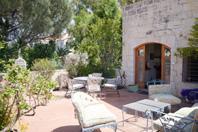

detecting a moral spirit in our universe. He observed a world carefully calibrated to support life and to enable human prosperity, and he reasoned that there must be a Creator. Beforehand, humanity had assumed their gods to be grotesque monsters who toyed with their human playthings, possessing absolutely no interest in their welfare. By discovering and popularizing belief in Hashem, Avraham broadcasted a vastly different divine image. He spoke of a G-d who was kind and compassionate, and who cared deeply for His human creations. Christianity, in particular, adopted this image of G-d along with the resulting duty to behave kindly, in the image of that G-d.
Over the centuries, as this image of a moral G-d took root, humanity constructed moral societies to reflect this
OU ISRAEL CENTER 45
Ilana Nelson 054.5341403 www.integrityrealestate.co.il
BEAUTIFUL SPACIOUS BAKA FAMILY HOME FOR SALE
186 SQM SPLIT-LEVEL HOME WITH TWO 40M TERRACES 7 ROOMS, 3 FULL BATHROOMS, 2ND FL (31 STEPS), GREEN AND BRIGHT, PRIVATE PARKING, STORAGE, EXCELLENT CONDITION, CHURCHLAND UNTIL 2077 PRICE REDUCTION!!! NOW ASKING NIS 5,200,000
image. A kind G-d could not possibly favor political systems which oppressed human liberty, or societies in which force and aggression ruled. By forging civil societies, public arenas were molded in the image of a moral G-d. Democracy and societies of civility are each reflective of Hashem's moral spirit and are milestones on the road to Hashem echad.



However, ironically, by empowering human freedom, modernity has also caused a deterioration of ethical behavior. Modern culture stresses the rights of each individual to freely behave as they choose, independent of any external system of constraints. This had caused the erosion of moral standards which traditionally framed human decision making. In a world of absolute freedom of expression moral codes are often ignored. It can fairly be stated that we live in societies which reflect Hashem's moral will, but, alternatively, many individuals in these societies fail to live up to the moral standards of the past.
STATE OF PEACE
Hashem is referred to as םולש or the G-d of peace and he bestowed this gift to humanity. Without peace between nations, between people, and within ourselves, human experience collapses. Humanity has done a poor job of preserving the gift of peace which Hashem offered us. Wars raged, almost unabated throughout history, pausing very briefly, but always recommencing. In the modern era war has become less frequent, but far more grisly and lethal.

Likewise, the pressures of modernity have stressed both our interpersonal relationships as well as our own inner happiness. We live with greater anxiety and with greater tension in our relationships. Our failure to preserve the divine gift of peace stalls the advance of Hashem echad.

STATE OF JEWISH PEOPLE
The greatest indicator of Hashem's presence is the condition of his chosen nation who represents Him in this world. As the condition of the Jewish people rises His presence is augmented. As it declines, his presence is obscured. Thankfully, we have returned to the historical stage and to historical relevance, and the rise of the Jewish people means

46 TORAH TIDBITS 1526 / VA'ETCHANAN
Shabbos Bistro Premium delicious shabbes meals Openning hours: Thursday 12 pm-2 am Friday 8 am-3 pm 02-9964469 | 054-8777347 Iben Shafrut 5, Rehavia, Jerusalem
Visit The Nefesh B'Nefesh

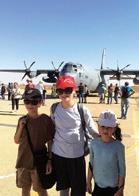

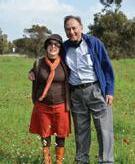

Israel Calendar to explore English-language events taking place all over the country!
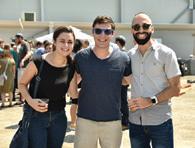

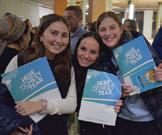
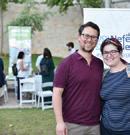
The Israel Calendar is an online platform showcasing virtual and in-person English-speaking programming throughout the country. All events posted on the calendar are designed for Olim seeking to connect with like-minded Anglos while benefiting from English-oriented events.
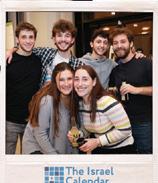
www.theisraelcalendar.org
Hosting an event? Post your events on the calendar and share your program with the expansive Nefesh B'Nefesh community all over Israel.
Cafe Oleh
VIRTUAL
WE ARE BACK FOR THE SUMMER
Join us for a cozy Hebrewlearning session at our next Cafe Oleh session!
www.nbn.org.il/cafeoleh
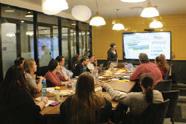
OU ISRAEL CENTER 47
HAFTORAH
BY REBBETZIN DR. ADINA SHMIDMAN INSIGHTS


YESHAYAHU 40:1 - 26
From Stars to Soldiers: Acknowledging Hashem's Command
This week, we continue the series of ten Haftorot that are connected to the time of year rather than a haftorah thematically related to the weekly Parsha. The following seven in the series are known as the Shiva d’Nechemta, the Seven Haftarot of Consolation. This week’s Haftorah is the first of the Haftorot of consolation.
Not only is Hashem’s dominion in the heavens, but He reigns on earth as well. Earlier in Sefer Yeshayahu, the posuk (4:3) describes how angels refer to Hashem as
as we recite in Kedusah,
And one would call to the other, “Holy, holy, holy! The LORD of Hosts! His presence fills all the earth!”
Lift high your eyes and see: Who created these? He who sends out their host by count, Who calls them each by name: (Yeshayahu 40:26)
Yeshayahu charges us to lift up our eyes in an effort to recognize the vast power of Hashem through the stars. It is not just the vast number of stars that communicates the power of Hashem but rather that He recognizes each star as unique with its own name and identity. The word םאבצ in our Haftorah is derived from the word army or legions. Just as a king has a relationship with his army where each individual soldier is counted and known, so too Hashem knows the number of stars and each one of them by name.
Rav Shimon Schwab in his commentary on Yeshayahu shares that while we use the term ”אבצ“ to mean army, the word is actually defined as a large group of people or objects. The term suggests a level of organization and structure. It is not the numbers that define an army but rather its organization, with each soldier having his or her own role and rank. Having an organized structure under one command is what gives an army its strength. To ensure its success, an army needs to have a unified command, with every person knowing exactly what is expected of them. Without this level of organization, the
48 TORAH TIDBITS 1526 / VA'ETCHANAN
הלא ארב־ימ וארו םכיניע םֹורמ־ואׂש בֹרמ ארקי םׁש ב םלכל םאבצ רפסמב איצֹומה
’ה
הז ארקו“ אֹלמ תֹוקבצ ’ה ׁשֹוד ק ׁשֹוד ק ׁשֹוד ק רמאו הז־לא ”ֹודֹובכ ץראה־לכ
תֹוקבצ
המלש האופר הניאר תב הרוא
army cannot function.
In calling Hashem by the name Master of Legions, we, along with the angels, acknowledge that each one of Hashem’s creations has a purpose - both in the heavens and on earth. Each star, each person, every creature has a name and role in recognizing Hashem’s presence in this world. We call Hashem by this name and He calls us His army as seen when we leave Egypt, ץראמ 'ה תֹוקבצ־לכ ואצי הזה םֹויה םצעב יהיו ׃םירצמ, to the very day, all the ranks of the LORD departed from the land of Egypt (Shemot 12:42). Just as the heavenly stars are known by name and number, we too count and shine in our unique role in our world. We each have the opportunity to serve - and be recognized - by the Master of Legions.
Do
Join our Kollel learning Gemora Shabbos for beginning & intermediate learners
Kollel Birkas Naftali Shmuel
In Arzei HaBira Shul
Especially suited for Baalei Tshuva and Retirees who never really got a handle on learning Gemorah. Personal attention and emphasis on Geshmak! Learning in Chavrusas and Shiurim.
Rosh Kollel: Rabbi Mordechai Blanck
Rabbis: Shmuel Litman, Moshe Gershenfeld, Mendel Yellin, Aharon Moshe Bleich
For questions
0527658512 (Rabbi Blanck)
0504160767 (Rabbi Gershenfeld)
www.angelrealty.co.il
For Sale in Ramot B
7 room, stunning semi attached home. Great garden. Quiet and peaceful location. 6.5 million
For Sale in Efrat

Zayit: * 300 meter cott age, Pitum Haketoret St. 4,990,000 NIS
*The Village – 8 room cottage, 4,700,000 NIS
Dagan: * 4 room garden apt. 100m, 2,590,000 NIS
Rimon: * Stunning semi attached home. On a plot of 430m! 7.5 rooms, fully renovated. 4.7 Million
Gefen: * 3 room apt. Option to add on a full floor. 1,690,000 NIS Gabi- 0524588716
THIS WEEK: CAN YOU PLEASE HELP make Uriel's upcoming Bar Mitzva! He is the son of a single mother living off Bitu'ach Le'umi. Thank you so much!
Can you help?
• Checks: Make out to “Yesh Ezra”
Send to: Yesh Ezra, POB 31476, Romema, Jerusalem, 9136101

• Bank Transfer: Bank Mercantile (17), Branch 642, A/C 79747843, Yesh Ezra To obtain your tax benefit receipt, send details by Whatsapp/email.
• Credit card:
Sara at 077-820-0196
Sunday, Monday, and Wednesday (10:15am - 2:45pm)
• Website: www.yeshezra.org
Click on “Donate Now”
Inquiries:
Menachem Persoff
050-570-1067
menpmp@gmail.com
OU ISRAEL CENTER 49
you want to improve your skills in Gemora & Mefarshim?
The Shabbat following Tisha B'Av is known as Shabbat Nachamu, the Shabbat of nechama - of comfort or consolation. Following the three weeks of mourning and reflection for the churban, the destruction of the Batei Mikdash (Temples) and of ancient Yerushalayim , we transition to focus more on the future, the comfort we find in the survival and growth of the Jewish People.
However, if we look at the opening verses of the special Haftara that is chanted for Shabbat Nachamu, Yeshayahu HaNavi's words suggest an added dimension to this Shabbat of comfort and consolation.
The opening pasuk reads: Nachamu, nachamu Ami, yomar Elokeichem - Comfort, Comfort my People says your G-d.
What is the significance of the apparent redundancy in this verse, that the word comfort is repeated twice? Who is comforting whom?
The Kedushat Levi, the great Chasidic Master, Reb Levi Yitzchak of Berditchev, zy'a , explains this verse as teaching us that really we should be comforted not only in knowing that our period of sadness and affliction has passed, but that comfort is amplified, is a dual comfort, through the knowledge that it is HaKadosh Baruch Hu who is responsible in bringing that comfort and tranquility.
The Aish Kodesh, the Piaseczna Rebbe zy'a, explained our verse in a very powerful way. The Rebbe points to the second
BY RABBI SAM SHOR Program Director, OU Israel Center

verse of the haftara to help clarify our opening verse.
Dabru al Lev Yerushalayim, Vkiru eleiha, ki mala tzivaa ki nirtza avona, ki lakecha miyad Hashem kiflayim bchol chatoteha.
Speak tenderly to Jerusalem, And declare to her that her term of service is over, That her iniquity has ceased; For she has received at the hand of Hashem, Double for all her transgressions.
The Rebbe asked, what does it mean that Yerushalayim received a double consequence? Hashem has endless compassion for each of us, what is the verse suggesting, that Hashem has doled out a double consequence for each of our transgressions?
The Aish Kodesh explains that when a person commits a misdeed, the person themself experiences that mistake as well as the outcome of that mistake. We must also acknowledge that each individual is endowed with a neshama , which is the aspect of the Divine, hidden within each of us. When we transgress, this innate Divine reflection also experiences both the misdeed and its consequence, hence the double consequence. However, the Rebbe continues, if this is indeed true, then the conclusion we can draw is that if the consequence is indeed double, then the Nechama, the comfort that will follow those consequences, will also be double.
50 TORAH TIDBITS 1526 / VA'ETCHANAN
SIMCHAT
SHMUEL
Nachamu, nachamu ami.

The Lev Simcha zy'a, the Gerrer Rebbe, develops this idea a step further and offers his own novel explanation of our verse. The Rebbe points to an interesting passage in the Midrash Rabba. The Midrash states al tikri nachamu nachamu Ami (my people), eleh Imi (rather with me). The Lev Simcha explains that not only do the Jewish People feel comforted on this Shabbat of nechama, but Hashem experiences comfort as well, Hashem is comforted in knowing that our pain is lessened, in knowing that we are healing and comforted.
This, explains the Lev Simcha, is the dual comfort mentioned in Yeshayau HaNavi's words, and this, explains the Rebbe, is the powerful message we are meant to take to heart on this special Shabbat. Hashem
is with us always, Hashem is pained when we are in pain, and shares in our comfort when we heal and are comforted.
May we all be blessed to feel that dual comfort this Shabbat, and each and every day.

OU ISRAEL CENTER 51
MASSAGE THERAPIST & FITNESS TRAINER 052.673.3704 I www.andyhealth.com | jerusalemmyhome@hotmail.com TUVIA ANDY HAAS BALANCE and FALL-PREVENTION SPECIALIST for OLDER ADULTS Maintain Healthy Bones and Muscles Decrease Stiffness and Joint Pain Increase Strength! Stay Independent!
FROM THE VIRTUAL DESK OF THE OU VEBBE
Cowbell for Help
QUESTION: Recently my mother had a hip replacement and needs help walking to the bathroom. May she ring a (cow) bell Shabbat night to wake me up? If not and she goes on her own, it is very dangerous.
ANSWER: The mishna (Beitza 36b) forbids dancing and clapping on Shabbat, as it could lead to fixing a musical instrument (gemara ad loc.). It is certainly forbidden to play a musical instrument, but the question is how far to take that.
The gemara (Eruvin 104a) relates that Ulla forbade making purposeful sound of any sort with an instrument on Shabbat. Rava said it is forbidden only to make a “sound of song,” (pleasant sounds, even if not musical, are included (see Rashi ad loc.)). Presumably, ringing a cowbell is forbidden according to Ulla and permitted according to Rava. Like whom do we pasken?
The Beit Yosef ( Orach Chayim 338) summarzies as follows. Although the Yerushalmi seems to concur with Ulla’s approach, the Rif and the Rambam (Shabbat 23:4) accept the lenient opinion of Rava. The Beit Yosef introduces the Agur’s

REBBE
RAV DANIEL MANN

compromise opinion (based on the Maharil): it is forbidden to make even a non-musical sound with any instrument that is made for the purpose of making sounds, even non-musical instrument. The Beit Yosef is puzzled by this opinion, as it appears too lenient for Ulla and too strigent for Rava.
Although the Shulchan Aruch (OC 338:1) does not bring the Agur’s compromise as halacha, the Rama (ad loc.) does. Thus, according to the Rama, although one may bang with his fist on a door with the intention to make noise (as long as it is not to a beat), he may not do so with a doorknocker or ring a cowbell, which is made for that purpose. Thus, it is permitted for Sephardim to use a doorknocker (see Yalkut Yosef ad loc.:12) and forbidden for Ashkenazim (Shemirat Shabbat K’hilchata 28:35). The same is true for a cowbell or the like to get the attention of someone in a different room.
For Ashkenazim, the question is whether need will make it permitted. The Be’ur Halacha (to 338:1) reasons that in the case of a non-musical use, the prohibition for Ashkenazim is based on uvdin d’chol, which makes it permissible to use the doorknocker when there is no other way to get into the house to sleep. The Shevet Halevi (IX:76) went back to the source of the Agur’s chumra, the Maharil (Shut Chadashot 38), who categorizes it as avsha milta (a weak and somewhat subjective problem
52 TORAH TIDBITS 1526 / VA'ETCHANAN
תמשנ יוליעל ל"ז ןמצלז לאיזוע םהרבא ןב םירפא לאוי
The Orthodox Union - via its website - fields questions of all types in areas of kashrut, Jewish law and values. Some of them are answered by Eretz Hemdah, the Institute for Advanced Jewish Studies, Jerusalem, headed by Rav Yosef Carmel and Rav Moshe Ehrenreich, founded by HaRav Shaul Yisraeli zt”l, to prepare rabbanim and dayanim to serve the National Religious community in Israel and abroad. Ask the Rabbi is a joint venture of the OU, Yerushalayim Network, Eretz Hemdah... and OU Israel’s Torah Tidbits.


- development beyond our scope) and treats the prohibition as a chumra, which he was matir in a case of mitigating circumstances about which he was asked.
The need of your mother, who is both infirmed and has concern for falling, which indeed is dangerous, is even greater. Therefore, the sources above indicate that she may use a cowbell. On the other hand, the Be’ur Halacha says that it is best done with a shinuy (unusual use of the body). He also says that it is permitted only when one neglected to provide a preferable alternative. One alternative that poskim raise concerning doorknockers is to use a different one from what he uses during the week (found in the Mishna Berura 338:7 and accepted by the Shemirat Shabbat K’Hilchata (23:46). You can thus use a different noisemaker for Shabbat. Presumably you could probably find a setup with an object that is not made for making noise (e.g., a metal tray and spoon, if it is loud enough) or obviate the matter by sleeping in the room.
The question is whether you should make efforts to come up with halachically preferable alternatives. The original gemara says that in the case in which the noisemaker is forbidden, it is permitted for a sick person (e.g., to help him fall asleep). It is unclear whether the gemara’s permission for a choleh is only when there is no viable alternative for the choleh, or is it that for a choleh, the prohibition does not exist. The
latter approach is stronger regarding a non-musical instrument, which has a particularly weak basis. Therefore, we do not want to complicate matters or disturb your mother by having her worry about an alternative to the cowbell unless it is simple and as effective.
OU ISRAEL CENTER 53
Having a dispute? For a Din Torah in English or Hebrew contact ‘Eretz HemdahGazit’ Rabbinical Court: 077-215-8-215 • fax: (02) 537-9626 beitdin@eretzhemdah.org
ONLINE
THE PRODUCTS YOU PREFER DELIVERED STRAIGHT TO YOUR DOOR! ORDER TODAY AND ENJOY SUPERIOR QUALITY, SELECTION AND SERVICE! Use coupon code welcome2ftf and save 5% off your first order! www.FarmToFamily.co.il Netanel 050-344-6261 | Office 058-444-6260 American Service! Want to shop from the convenience of your home? American Products & Specialty Items! Top quality, organic & regular Mehadrin produce
ORDER
AND GET
1221

Real Life Rescues
Real Life Rescues
EMT Saves Baby from Severe Allergic Reaction Following First Taste of Tahini
Saving A Neighbor’s Baby After A Severe Allergic Reaction
On a Motzei Shabbat earlier this year in the Jerusalem neighborhood of Ramat Eshkol, a 5-month-old baby suffered an anaphylactic shock, a life-threatening allergic reaction. The parents of the infant quickly called for assistance, and Ari Odzer, an immigrant from New York and United Hatzalah volunteer EMT who lives in the same building, quickly made his way to the apartment, just five floors down.
On a recent Tuesday morning in Jerusalem, parents were feeding their 6-month-old baby and introduced him to tahini for the first time. Within minutes, the baby developed a severe allergic reaction. The infant's parents immediately called emergency services, seeking urgent help.
Upon arriving at the scene, Ari inspected the child and found a major rash on her back as well as low blood pressure, rapid heartbeat, and difficulty breathing, all symptoms of anaphylaxis.
The American-born EMT immediately took out the lifesaving EpiPen device from his medical kit and pricked the baby to administer the dose of adrenaline.
United Hatzalah volunteer EMT Shalom Klein, alerted to the emergency through his proximity alert system, sprang into action as the first responder on the scene. Arriving promptly, Shalom was confronted with a distressing sight - a baby boy with swollen lips and tongue, struggling to breathe, and covered in a worrisome rash.

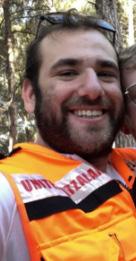
“The child’s condition improved quickly and she regained her normal appearance,” he recounted after the incident. “I then held the baby, while the mother was getting ready to go to the hospital. While she threw up several times on me, it was all worth it for me, knowing that I had just helped save her life.”
After an ambulance arrived several minutes later, the infant was transported with her mother to the hospital for further treatment. She has since returned home and is in good health.
Recognizing the symptoms as indicative of an anaphylactic shock, the volunteer knew immediate intervention was crucial. Without hesitation, he administered a life-saving EpiPen injection, delivering a dose of epinephrine to counteract the severe allergic reaction. The powerful medication quickly took effect, and the infant's breathing became less labored. The swelling in the lips and tongue began to subside, providing much-needed relief to the child.
Ari, who is studying social work in Jerusalem through a Yeshiva University program, added: “It’s a privilege to be able to help save a baby’s life and even more so in my own building. It’s my first time using an EpiPen in a reallife situation, and thank God it all worked out for the best since I had received the device just two days earlier.”
As the symptoms continued to recede, the EMT monitored his condition while awaiting the arrival of a mobile intensive care ambulance. Several minutes later, the ambulance team arrived and transported the infant to the nearest hospital for further treatment and observation.
Reflecting on his volunteer work, the EMT concluded:
“I decided to volunteer with United Hatzalah about two years ago after being inspired by my mother, who volunteers with the organization in the Woman’s Unit. We have since been on several calls together, saving lives and delivering babies, and it’s an incredible feeling. Being able to be there for people in these emergencies is one of the

Reflecting on the incident, Shalom emphasized the importance of having an EpiPen readily available. "It's a great thing I had an EpiPen in my medical kit," he stated. "An

54 TORAH TIDBITS 1526 / VA'ETCHANAN
EpiPen can save a person's
within minutes and is a huge help for both EMTs and patients." Flying Soon? Travel with Confidence 1UniTravel - Medical Insurance at great prices Choose from multiple options 1unitravel.brokersnexus.com 1UniSim - Sims for USA and Worldwide Starting at $40 sales@1unisim.com Call 077-400-3199 or USA 718-715-0001 A small Sefer Torah with its own Aron Kodesh is available to shiva houses or for any other necessary occasion on a temporary free-loan basis. If needed call Uri Hirsch 0545513173
life
Brickstone Safes have come to Jerusalem! Your
Our responsibility
Brickstone specializing in safety deposit vaults is opening its new branch to residents of Jerusalem and surrounding areas in the Clal Building. At your service are safety deposit boxes of various sizes to store your valuables. The center is secured 24/7 at the most stringent international standards.
The location and boxes are secured by Lloyds International.

OU ISRAEL CENTER 55 דסב Security European Standard Biometric Identification Armored Vault Sophisticated Alarm CamerasSystem 24/7 Comprehensive Secur ty
9936
peace of mind
The bank closed… We’re here! Safety deposit box rental and appointment coordination Ext. 2 Clal Building, 97 Yafo Street, Jerusalem (former Discount Bank building ) sophisticated cameras 180 NIS discount for those who bring this ad!
Halachic Supervision
Due to several high profiled mistakes in fertility clinics, we have recently seen an increase in demand for halachic supervision. The possibility of such mistakes occurring is of tremendous concern for couples undergoing treatment, and PUAH's supervision is a great comfort for them. A recent television expose discussed the potential mistakes that can occur, and tried to understand how such tragic mistakes happen. The program, unfortunately, omitted to mention that halachic supervision can prevent such mistakes happening, and can be a solution for this worrisome phenomenon.


I have been asked how the supervision works and the rationale behind it. Why do we need halachic supervision for fertility treatment, after all, we do not have halachic supervision for other

medical procedures, even though mistakes could happen there as well?
Our Sages maintained a very high standard regarding Jewish lineage, in the words of the Gemara (e.g. Ketubot 13a) the Sages made a higher standard for lineage, maala asu beyuchasin.
A woman cannot get married within three months of her previous husband dying or after getting divorced. The Gemara (Yevamot 42a) explains that the reason for this law is that there must be a distinction between the first and second husband. There is an importance in knowing who the father is, and this has ramifications for a variety of halachot – will the child inherit the first or second husband, which man must the child consider his father with all the implications. The Gemara also suggests that the reason for this period, between the two marriages, is that the child will not marry a sibling. If the woman were to marry immediately and have a boy, she may assume that the father is the second husband. The child could then
56 TORAH TIDBITS 1526 / VA'ETCHANAN
RABBI GIDEON WEITZMAN
Machon Puah for Fertility and Gynecology in Accordance with Halacha
grow up and marry the daughter of the first husband, born after the divorce, assuming that they are not related. In truth, the woman was actually pregnant when she married the second husband. The couple coming to get married are, in fact, siblings. Therefore, the halacha is adamant that there must be a three-month period between the marriages. This is so important, that, even in cases where there is no concern that siblings would marry the law remains and she cannot remarry until the three months are over. For example, if woman is obviously pregnant when she wants to get married, and so it is clear that the first husband is the father of the child. This is to strengthen the idea that wherever there is a question of lineage we are strict.








This is the halachic rationale for needing halachic supervision for fertility treatments. More on this next time.




OU ISRAEL CENTER 57
GREAT VIEWS & GREAT PRICING View from the 22nd-floor Penthouse Porch of a project finishing in March 2024 4 Bedrooms 2 Parking Spots Storage Room, 163 sqm Apt + 2 large Porches totaling 94 7 sqm 4 Elevators including a Shabbat Elevator Outside the building is a Light Rail stop that will take you to the Old City and Machane Yehuda in 20 minutes J e r u s a l e m , I L 6 9 7 M N I S IZZY LEIZEROWITZ IL 972 52 682 9367 USA 786 385 8859 A s h k e l o n , I L 3 2 5 M N I S View from the 7th-floor porch of a 4Bedroom apartment in a project finishing in June 2024 2 Parking Spots, Storage Room, 126 sqm Apt + 21 sqm Large Porch There are 3 Elevators including a Shabbat Elevator Located just across the street from a new Shul and minutes away from the Marina with shops restaurants and boating Broker Fee: 2% + VAT
September 3, October 1, October 29, November 5, December 3 & 17, 2023



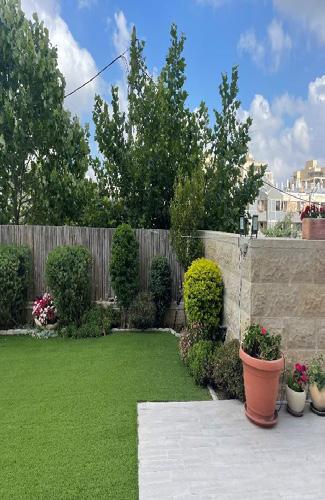

58 TORAH TIDBITS 1526 / VA'ETCHANAN Gilinski Real Estate Your realtor in Jerusalem We have 2 garden apts one in Ganai Tzion and one in Arnona! Contact us for more info! N Nahum Glatzer 050-7225694 For more information: Dr. Evelyn Rappoport PSY.D. NY LICENSED PSYCHOLOGIST / PSYCHOANALYST drevrapp@gmail.com | 052.616.9881 Mindful Grandparenting BLENDING, BONDING & TRANSMITTING LEGACIES SUPPORT ● UNDERSTAND RE-IMAGINE ● EXPLORE
11-12:30 on Zoom
Sundays
After August 1: 600 ₪ for the series The Group is limited to only 8 participants!
Early registration by August 1: 550 ₪ the series

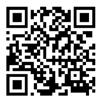
OU ISRAEL CENTER 59 Join United Hatzalah for a thrilling all-inclusive cycling experience throughout Israel to save lives. $6500 fundraising commitment per rider Israelrescue.org/blog/ride REGISTER NOW! UNITED HATZ AL AH NOVEMBER 12-19, 2023 I ISRAEL EARLY REGISTRATION OPEN See Israel like Never Before!

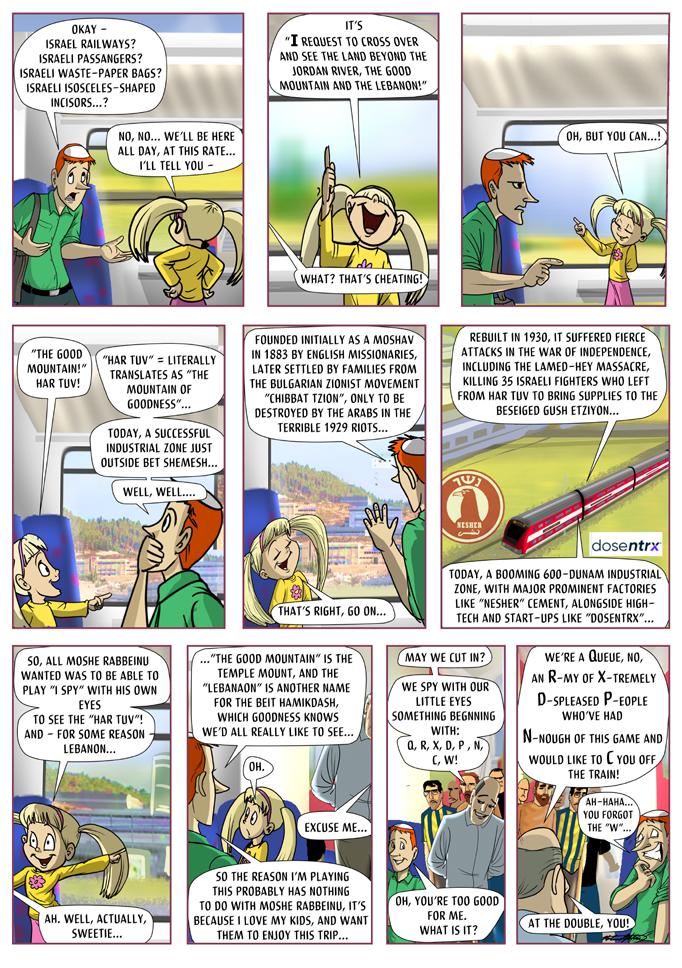
TORAH 4 TEENS
BY TEENS NCSY ISRAEL
 Gavriel Novick Director of Regional Development
Gavriel Novick Director of Regional Development

You Have Only Just Begun
The Parsha starts with Moshe’s prayer asking Hashem to let him enter Eretz Yisrael. Moshe begins with the words “You have begun to show your servant your greatness and your strong hand…” What exactly is Moshe referring to with these introductory words?

Rabbenu Bachya answers that Moshe is referencing Matan Torah. Hashem began to show his greatness to Moshe and Bnei Yisrael through the giving of the Torah. It is only fitting then that he continues to show his strong hand by bringing them to Eretz Yisrael. The Torah is meant to be fully fulfilled in Eretz Yisrael. Therefore, the next step after receiving the mitzvot should be entering into the Land of Israel.
The Ralbag explains it differently. In this introductory line Moshe was focusing on himself. Despite Moshe’s close connection with Hashem throughout the midbar, Moshe still felt that it was only the beginning. There was so much more for him to accomplish in his own moral and righteous being which could only be done in Eretz Yisrael.
The Land of Israel has the ability to raise us up whether it is due to the inherent holiness of the land and God’s presence, the mitzvot that can only be done here, or the environment which aids in our religious growth. Coming here and Aliyah is only the beginning. We need to see ourselves with the lens of Moshe; that we can always be striving for new heights and deeper connections.
This is exactly what NCSY Israel is all about! Through our growth-oriented programming and dedicated staff, teens tap into the magic of the Land and develop their religious Zionist identities. To date we have inspired over 1,700 teens here in Israel. But that’s only just the beginning! And we can’t wait for all that is yet to come!
Shua Golubtchik 12th Grade

Raanana
Seize the Mitzvah
Parshat Va'etchanan is split into 2 main parts. At the beginning, we have a speech about emunah in Hashem, including not building idols, etc. Moshe then begins enumerating the mitzvot, starting with Aseret Hadibrot and Shema. In the middle of these two speeches, we have a section about the arei miklat, cities of refuge, on
62 TORAH TIDBITS 1526 / VA'ETCHANAN
the East Bank of the Jordan River. Where does this section belong? Is it a conclusion to the first speech or an introduction to the second?
Rashi explains the pesukim 'Ve-zot haTorah...' (Devarim 4:44-45) to be an introduction to the mitzvot, as in pasuk 45 we talk about the 'rules and laws,' which would serve as a great introduction to the mitzvot. Yet, how would Rashi explain the first 3 pesukim about arei miklat? He writes that despite Moshe being at the end of his life, knowing he won't go into Israel and won't be able to establish the other arei miklat in Israel proper, he still took the opportunity to start a mitzvah and do what he could.

According to this approach, why was it important to introduce the variety of mitzvot with this mitzvah? If Moshe wanted to do a mitzvah, he could have just worn
tzitzit. Perhaps what was so special in establishing the arei miklat was that it was a once-in-a-lifetime deal, and as Rashi points out, Moshe seized the opportunity despite knowing he won't live to see the end of his efforts.
Another reason I would like to suggest is that Moshe was discreetly giving the Levites their nachala and making sure they knew they had at least something before conquering Israel. The Torah doesn't specifically mention that the arei miklat were the Levites' cities because Moshe was a Levite himself and didn't want to seem selfish. This highlights Moshe's humility.
I think we can learn from here that we should always act on a mitzvah and seize it when the opportunity presents itself because we don't know when it will appear again. And in all the mitzvot we do, we should always stay humble.
OU ISRAEL CENTER 63
As we mourn the destruction of the Temple in Jerusalem, Almighty says: LORD This is what the we must remember: and glad occasions and months will become joyful fifth… fourth, “The fasts of the Zechariah 8:19” happy festivals for Judah
There is hope, even on our saddest day, that Jerusalem will return to its original glory!
www.remaxjerusalem.com











Spacious 4-room apartment plus sukkah balcony. Near shops and healthcare facilities.
NIS 2,850,000
David Weiser 055-276-2960
Sderot HaNasi HaShisi., Kiryat Ha’leo m
Beautiful 78 sqm apartment. High ceilings. Master + 3 small bedrooms (half rooms), 9 sqm balcony, 2 parking spots, storage.



NIS 3,700,000
David Weiser 055-276-2960
Ha-Gilgal St , Ma’ale Adumim
Beautiful newly renovated 350 sqm villa full of light. 9 rooms, 5 bathrooms. 20 sqm balcony





NIS 4,850,000
Michael Brand - 054-440-8872
Brenner St., Talbieh
Beautiful 129 sqm apartment full of light. 3 rooms, 2 full bathrooms. Sukkah balcony in a full-service building (pool, gym, etc.)
NIS 8,950,000
Orna Even 054-621-6069

Mordechai Hayehudi St., Baka
Magnificent Garden home, fully renovated 90 sqm, 3 room + basement room/ study, no steps, private entrance, large garden Furn + appliance inc. NIS 5,500,000
Alyssa Friedland 054-668-4111
Horkania St., Rasco
4 room apartment incl. en-suite, renovated to a high standard, Sukkah balcony and storage, 2 bathrooms and shower.

NIS 2,900,000
Sharon Sasson 050-912-1234
Ha-Dishon St., Malha
4 and a half room apartment, 2 bathrooms, 109 sqm, central A/C, Sukkah balcony, central A/C, elevator, parking. NIS 3,900,000
Gadi Lissak 050-212-7748
Ramada Hotel, Kiryat Moshe
2 adj. furnished suites 50 sqm. Each with a master bedrm, living area, kitchen, balcony, shabbat elevator + amentiies (2 pools, lobby, gym etc). NIS 3,600,000
Shlomo Benzaquen 052-601-4411
Beit Lehem Rd 118א, Baka
Spacious apartment 3 bedrooms, 81 sqm, walk-in closet, parking, storage, 6t floor, elevator, easy accessibility
NIS 3,100,000
Judit Blumenfrucht 054-431-8814
 Yosef Nevada St., Pisgat Ze’ev
Yosef Nevada St., Pisgat Ze’ev
The largest collection of exclusive Jerusalem properties is just one search away

































































































 SMILES Faculty, OU Israel Center
SMILES Faculty, OU Israel Center




































































 Gavriel Novick Director of Regional Development
Gavriel Novick Director of Regional Development
























 Yosef Nevada St., Pisgat Ze’ev
Yosef Nevada St., Pisgat Ze’ev